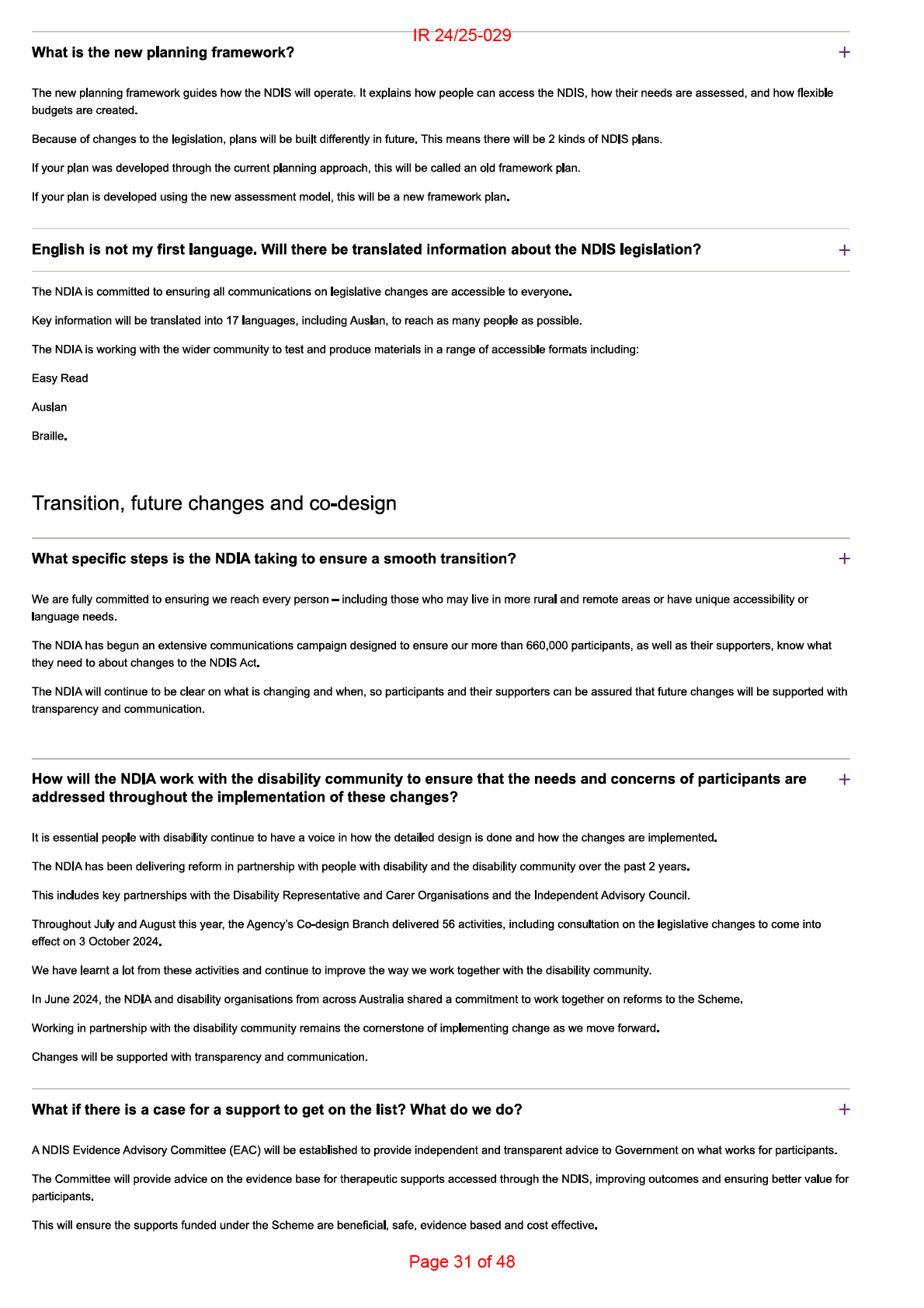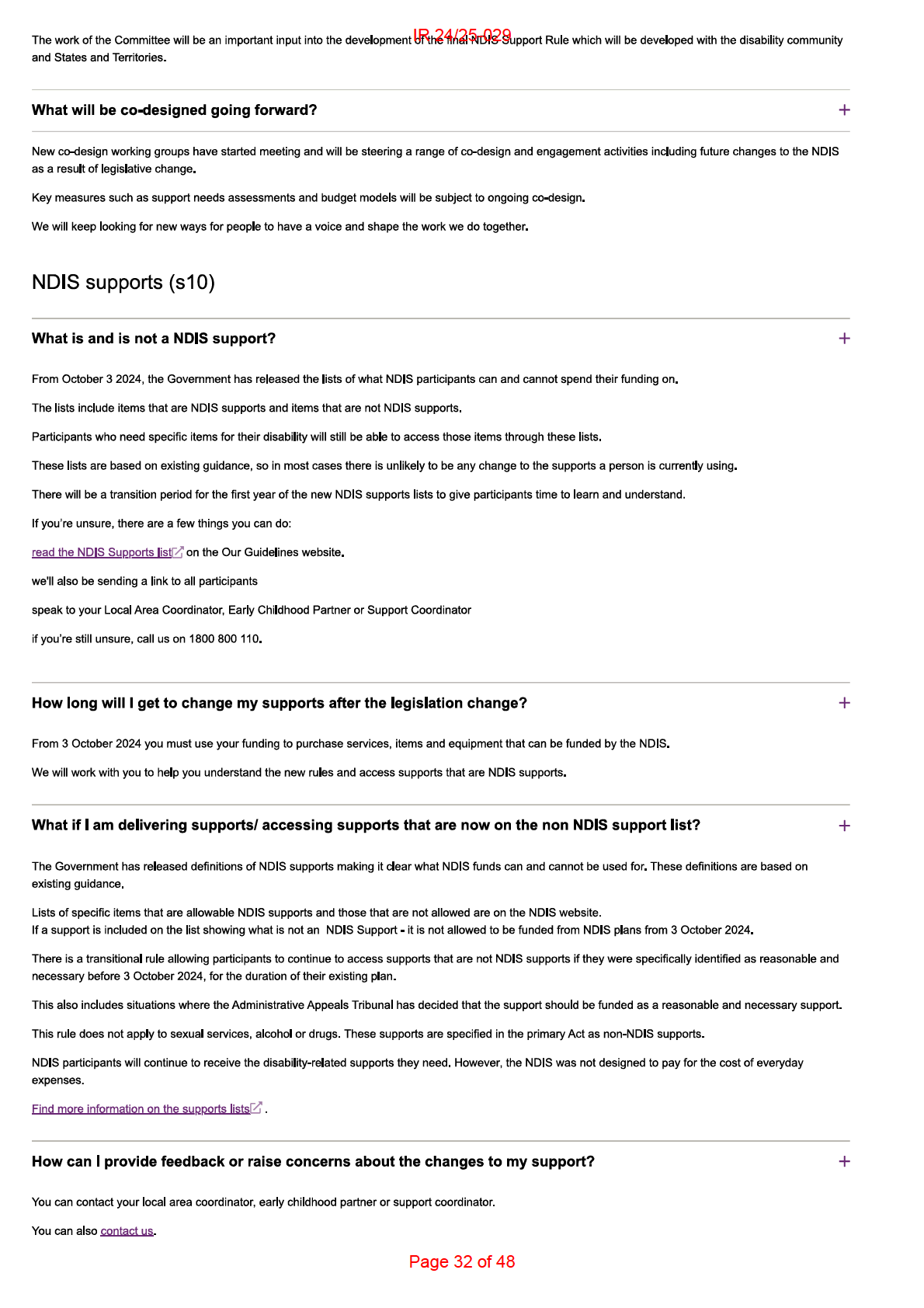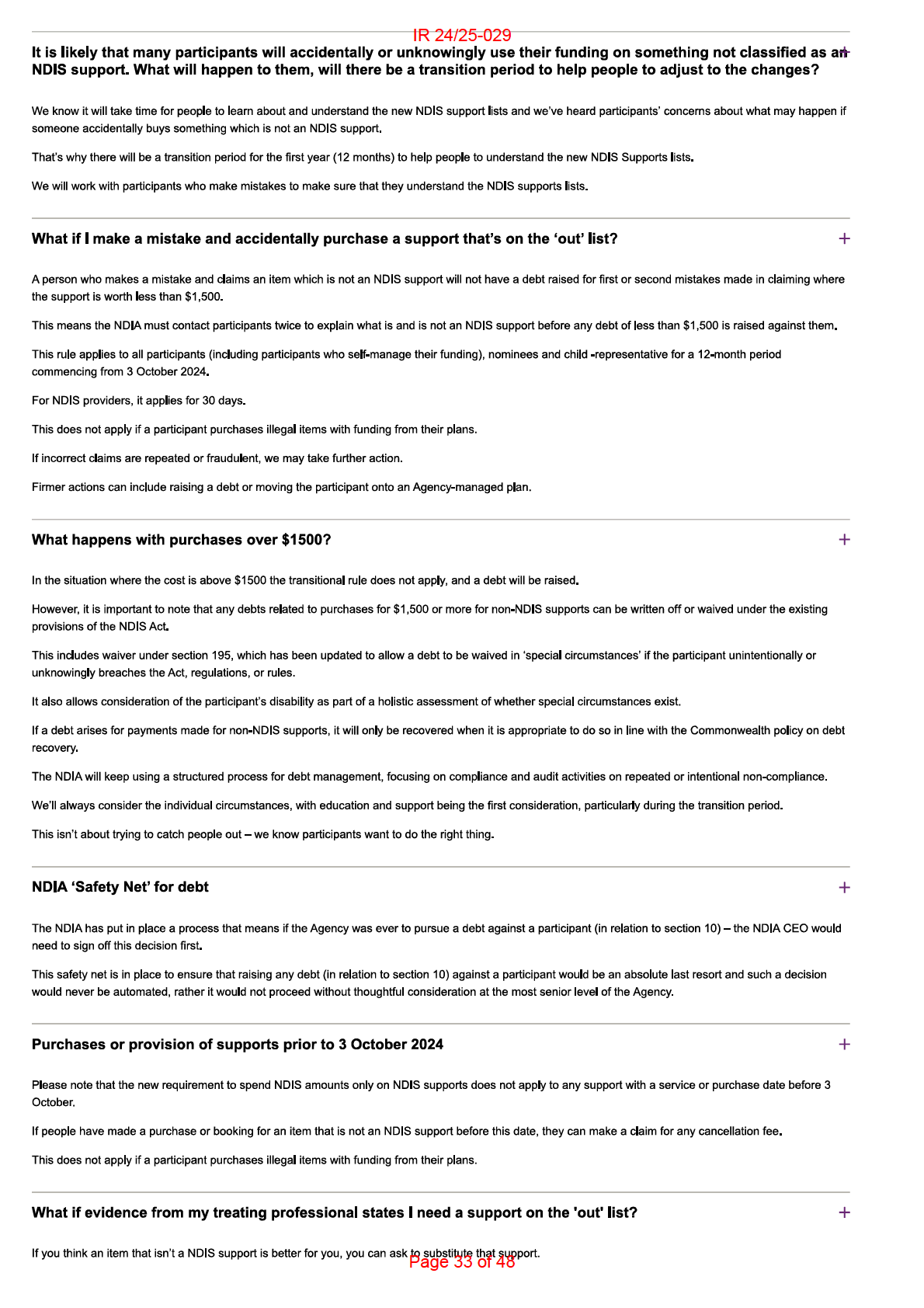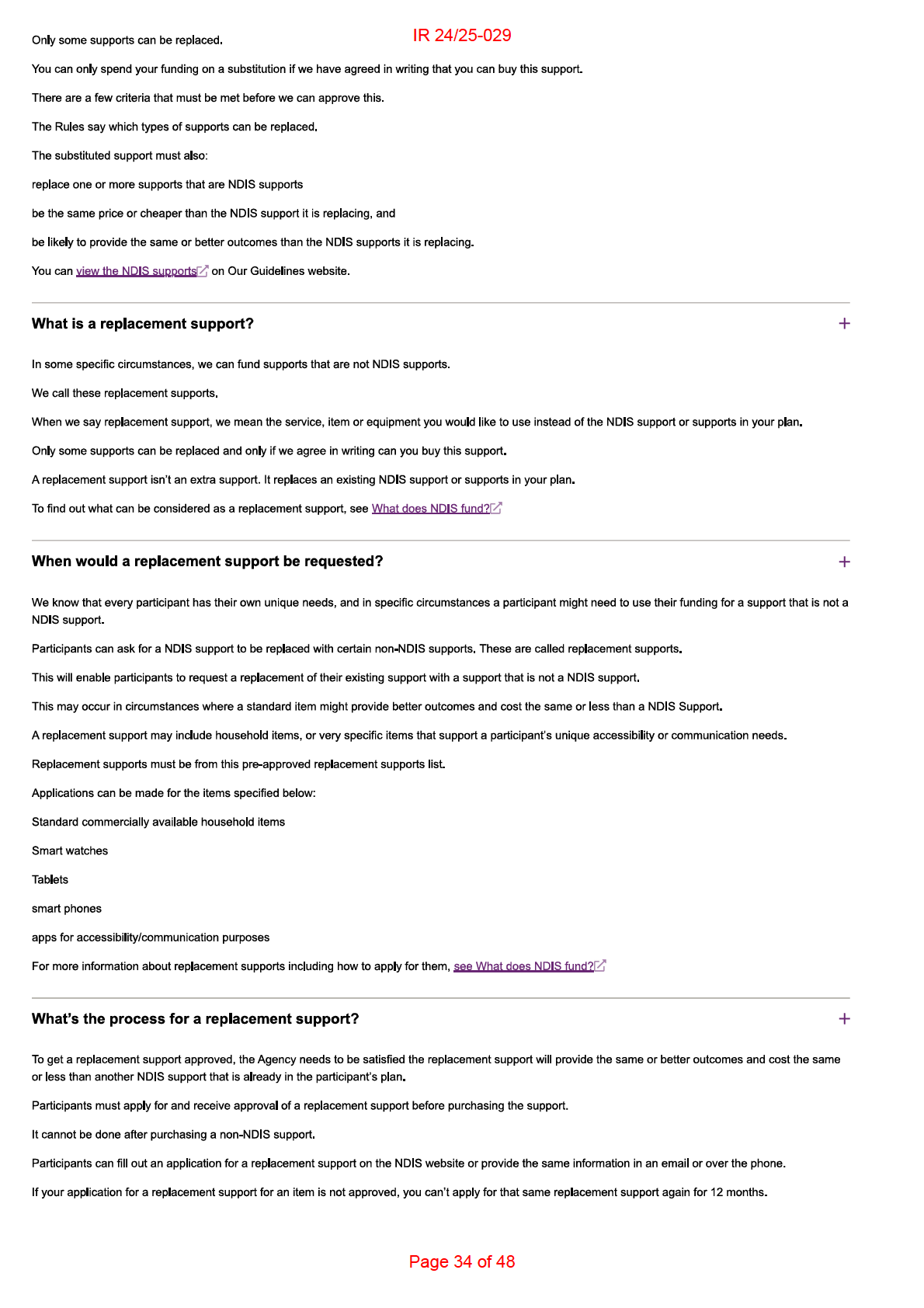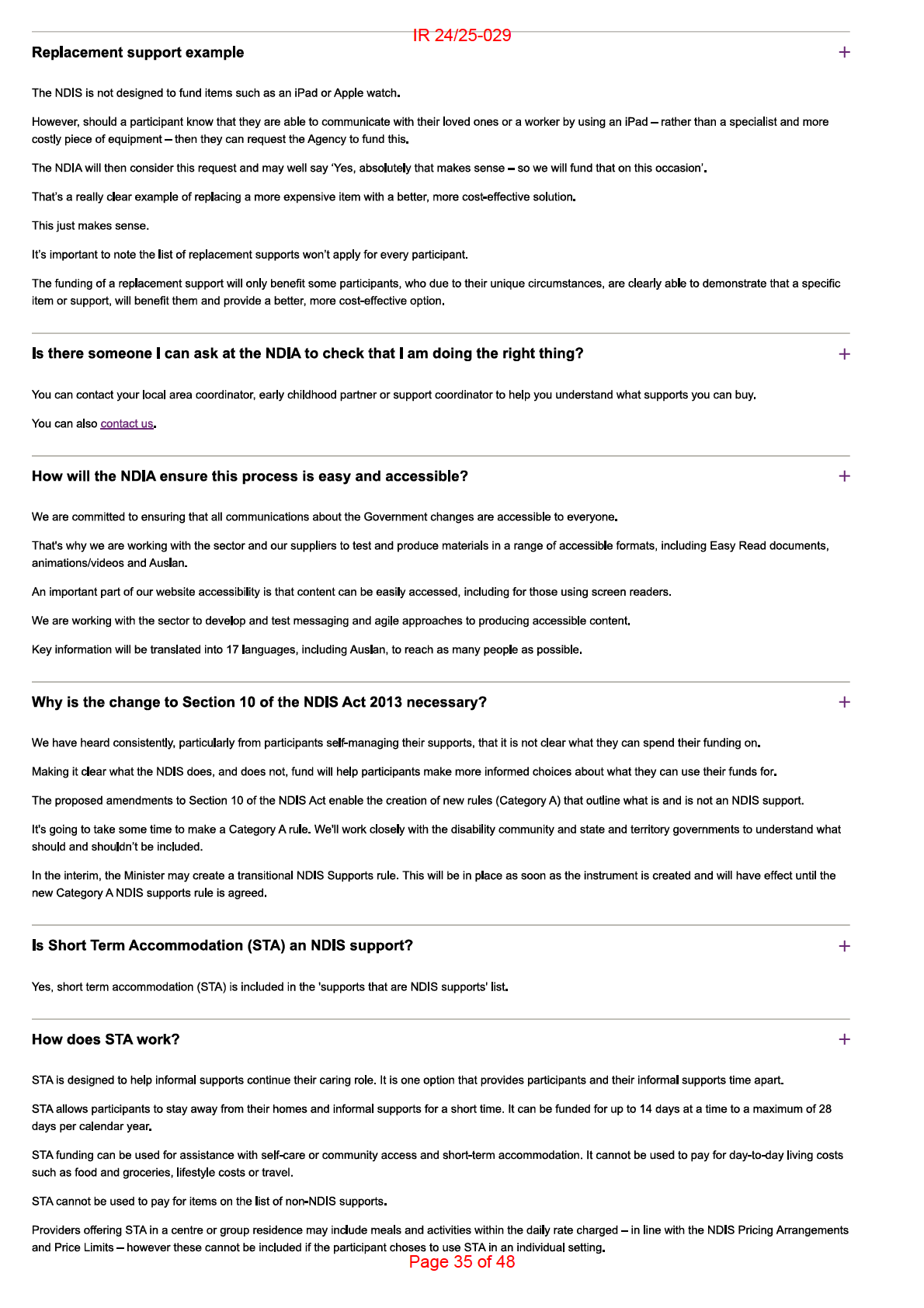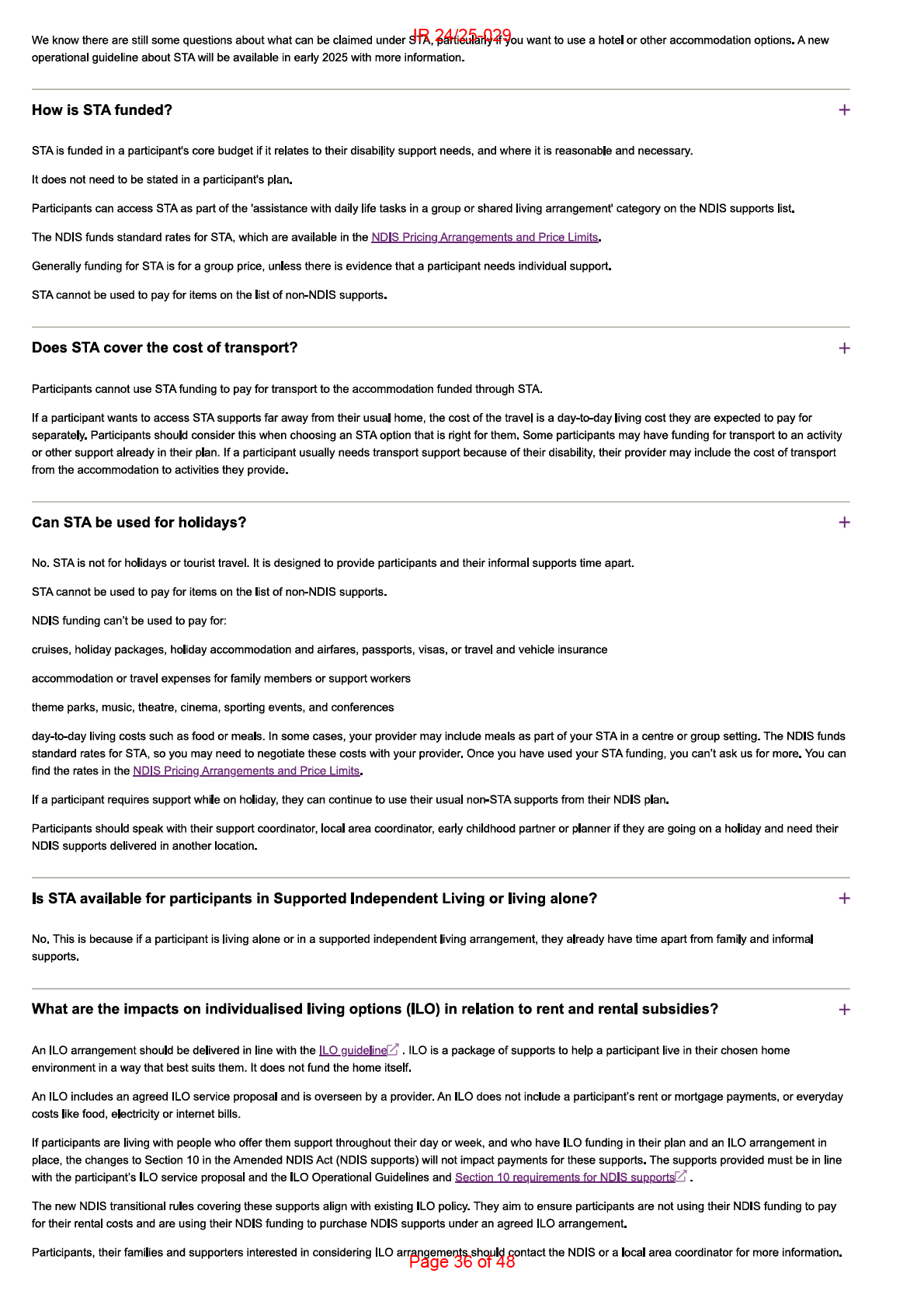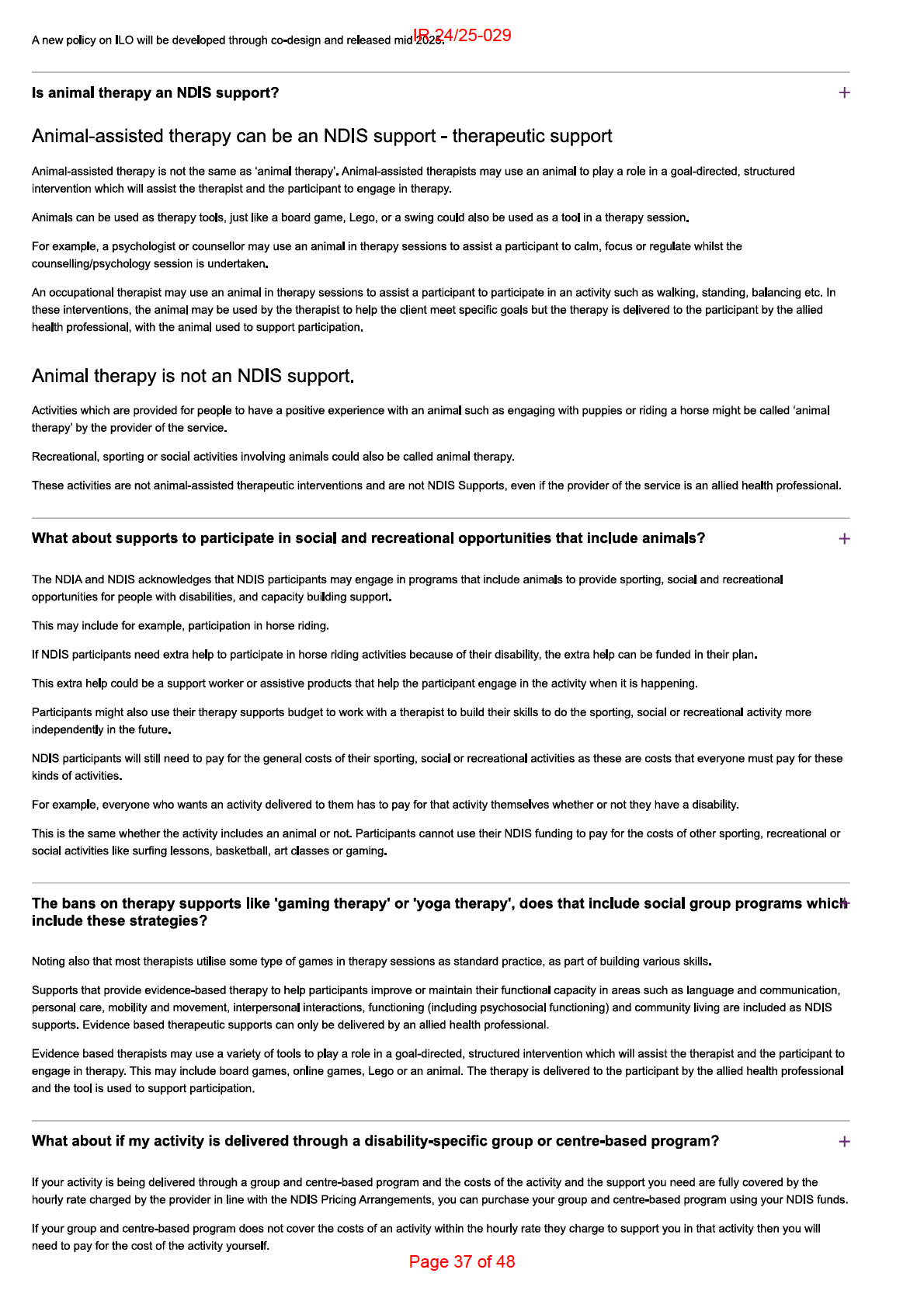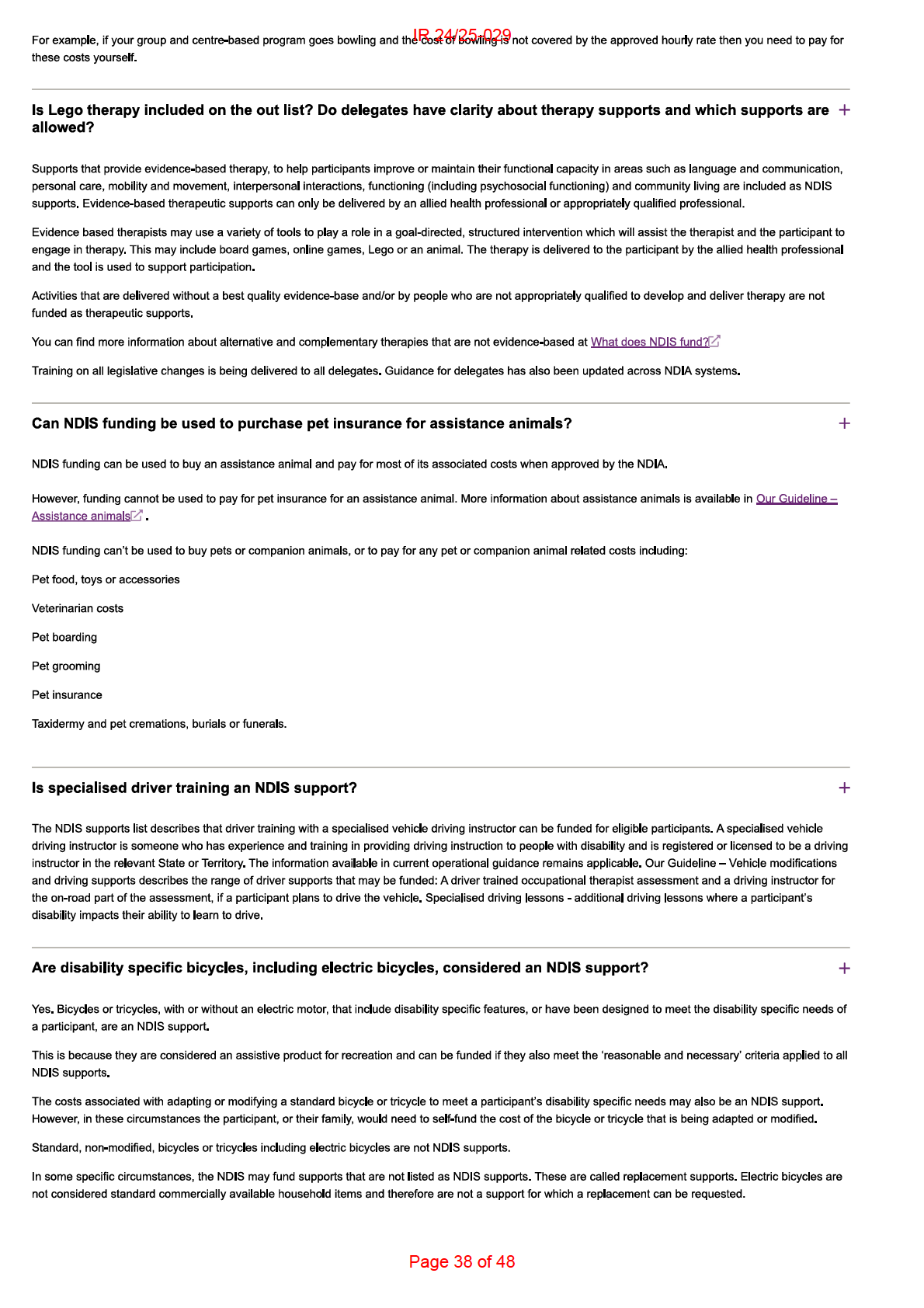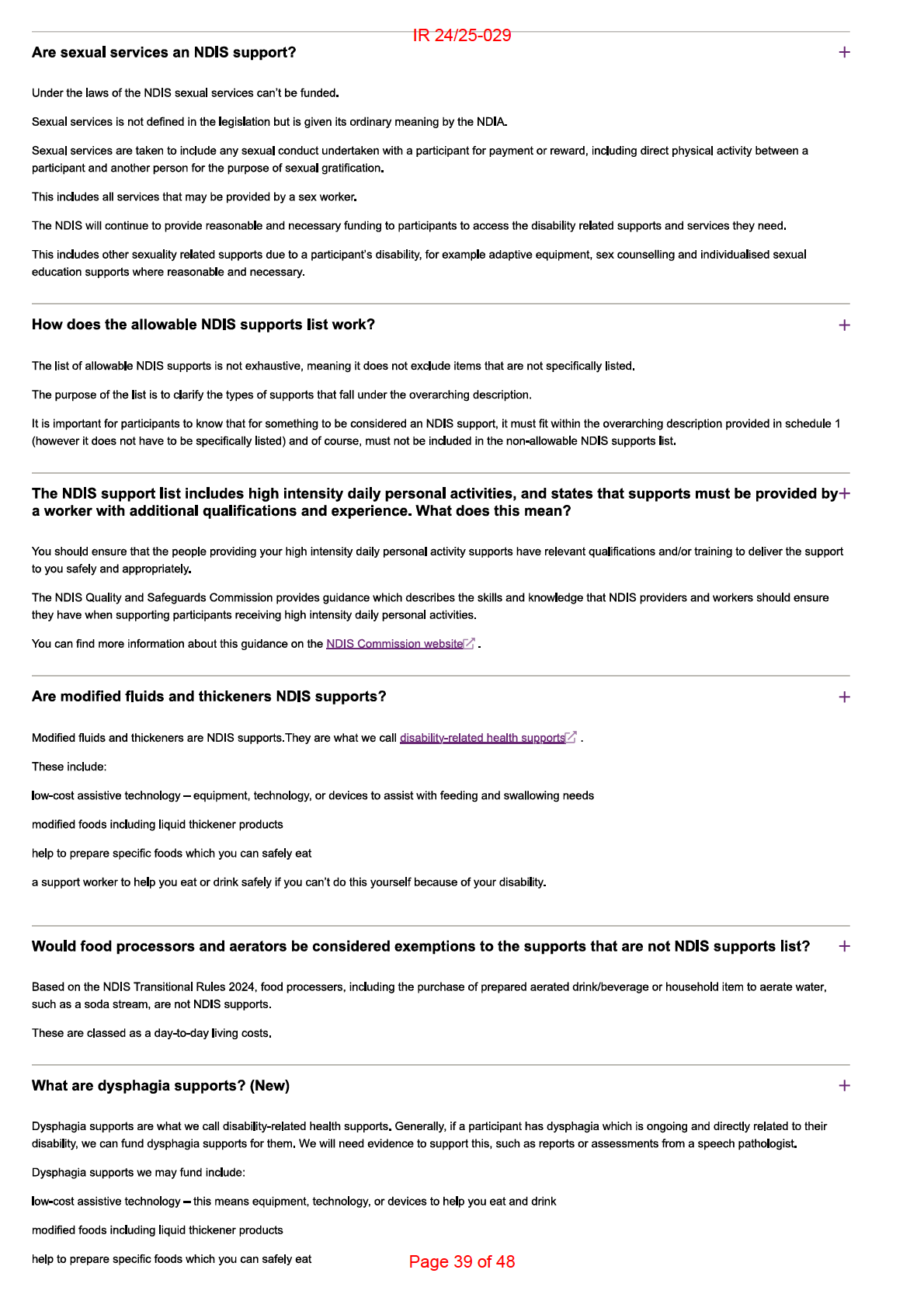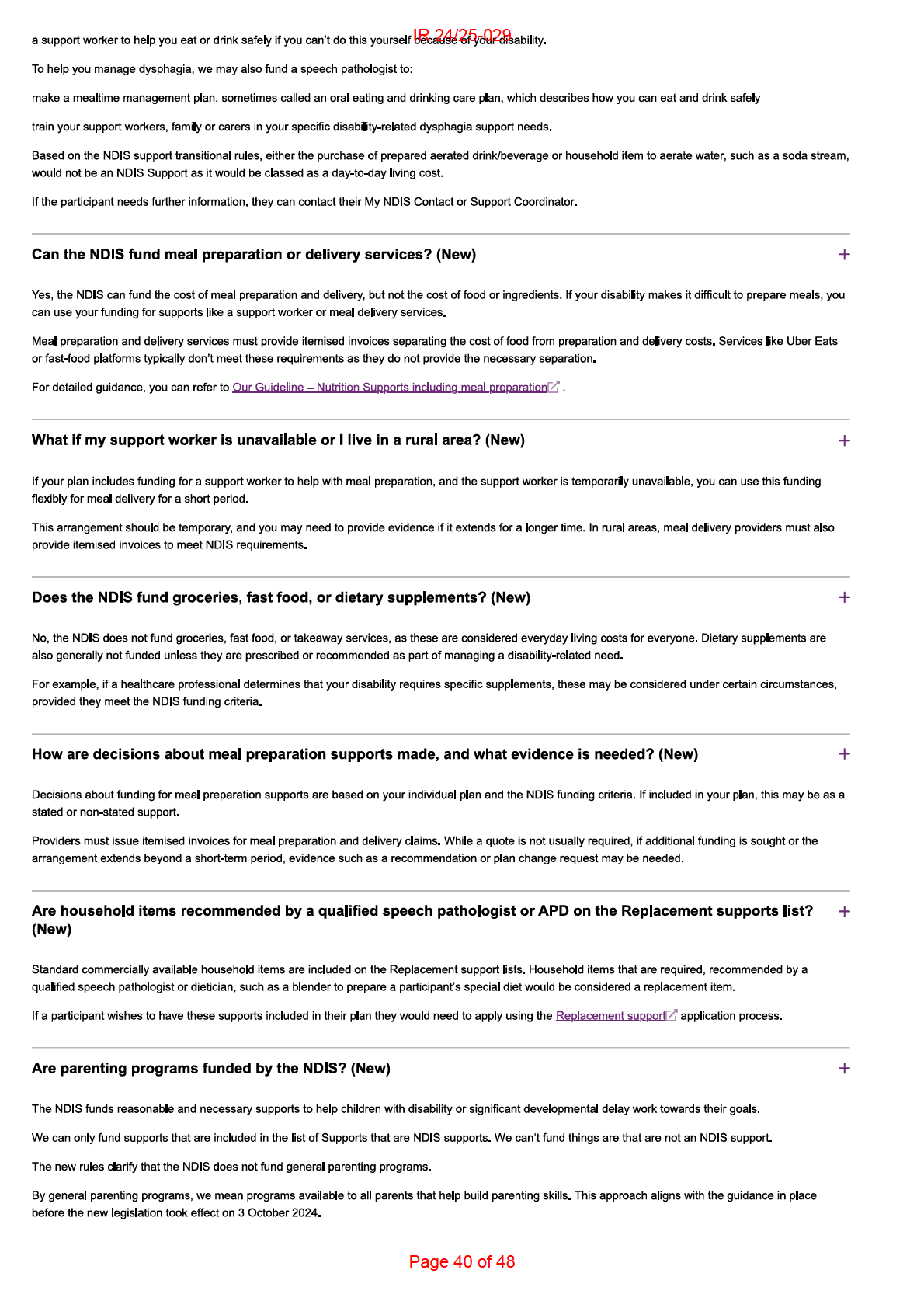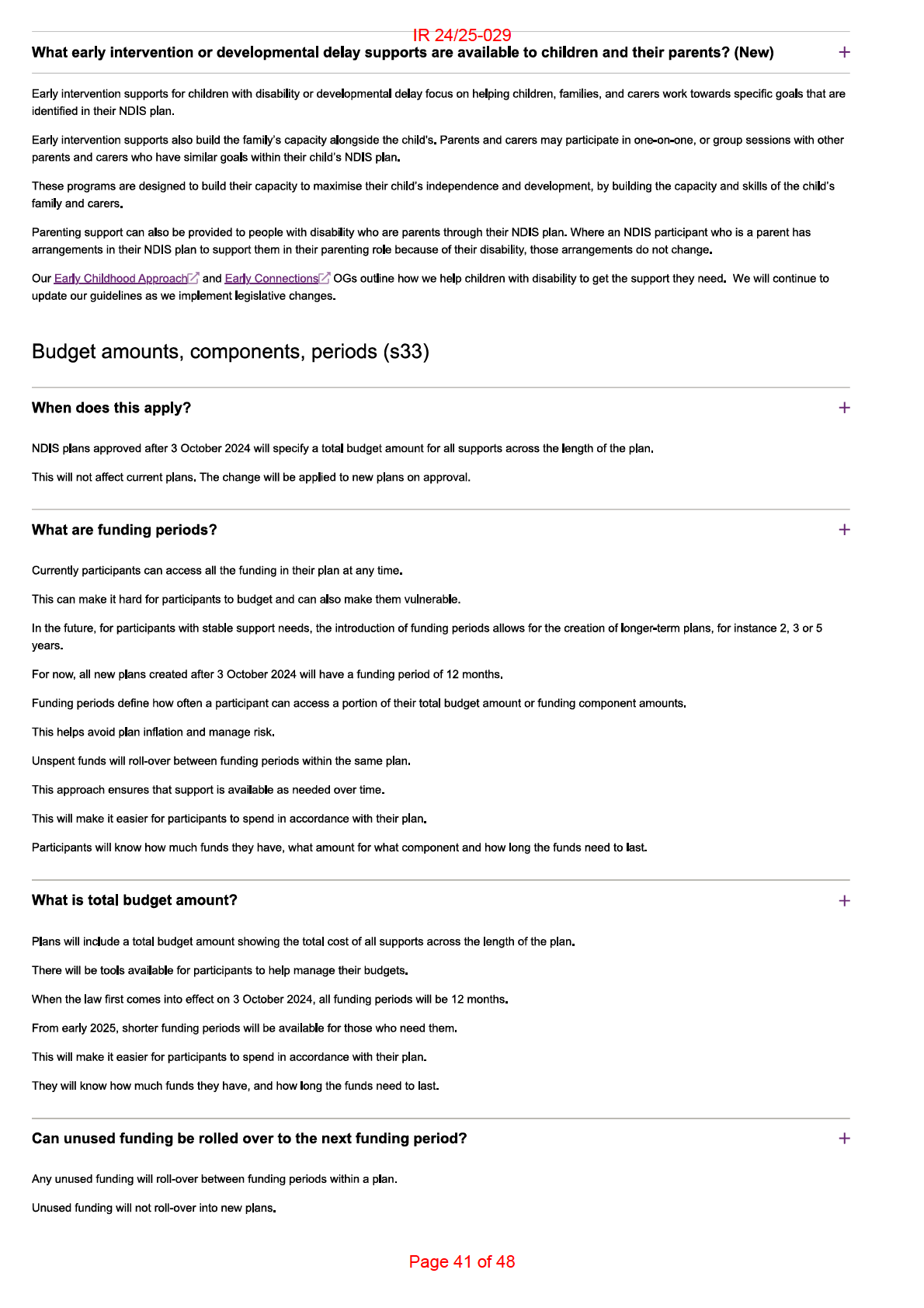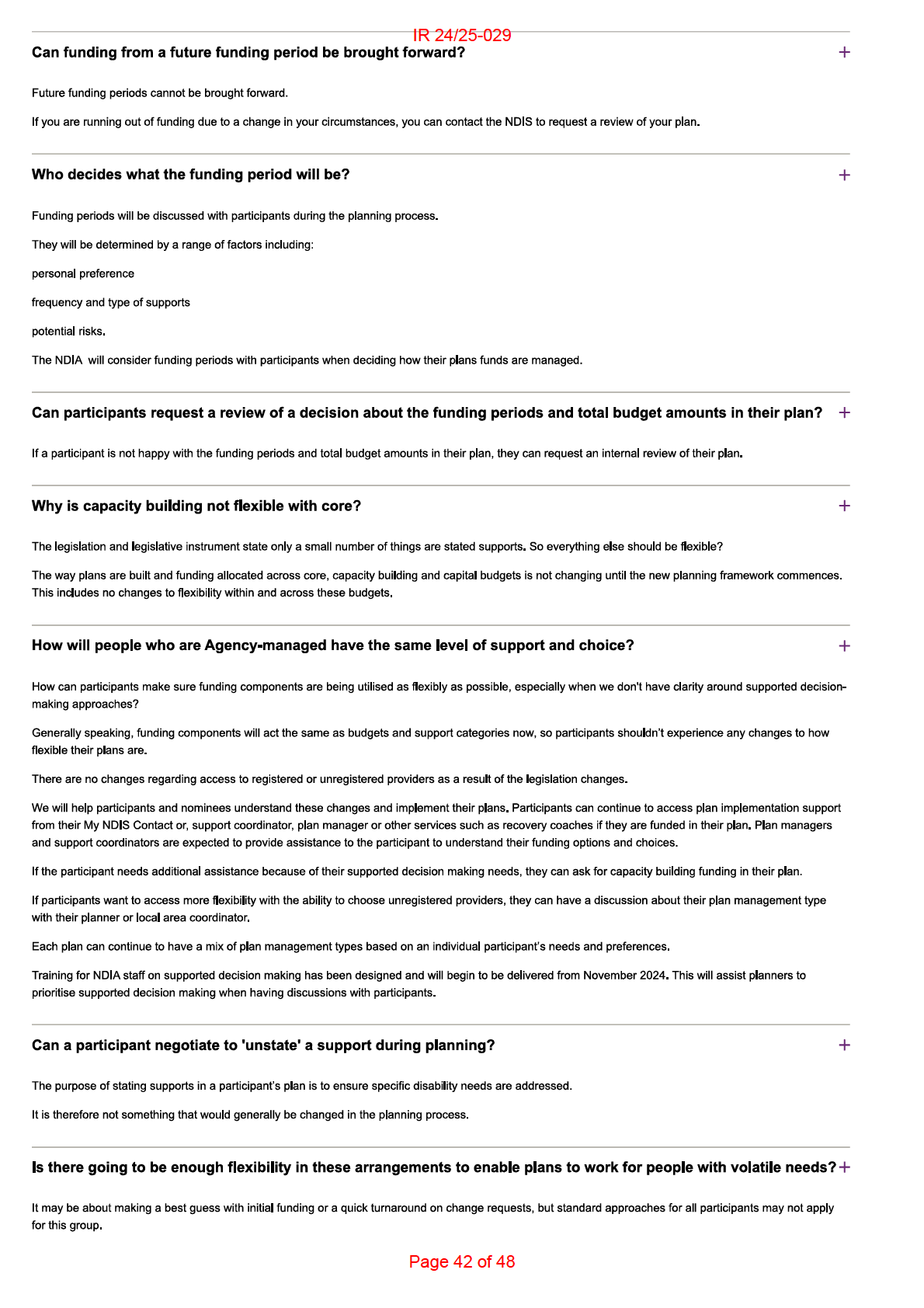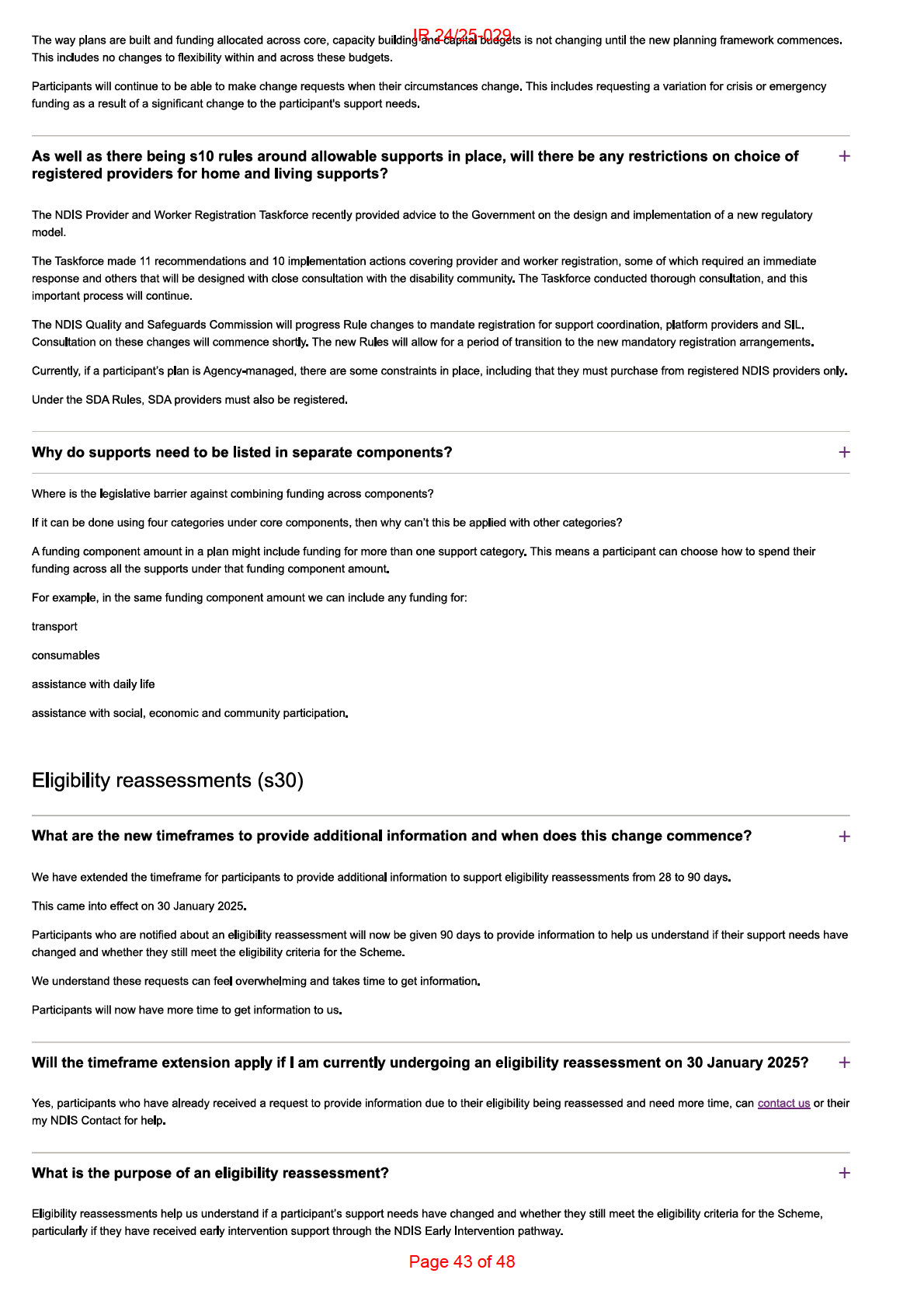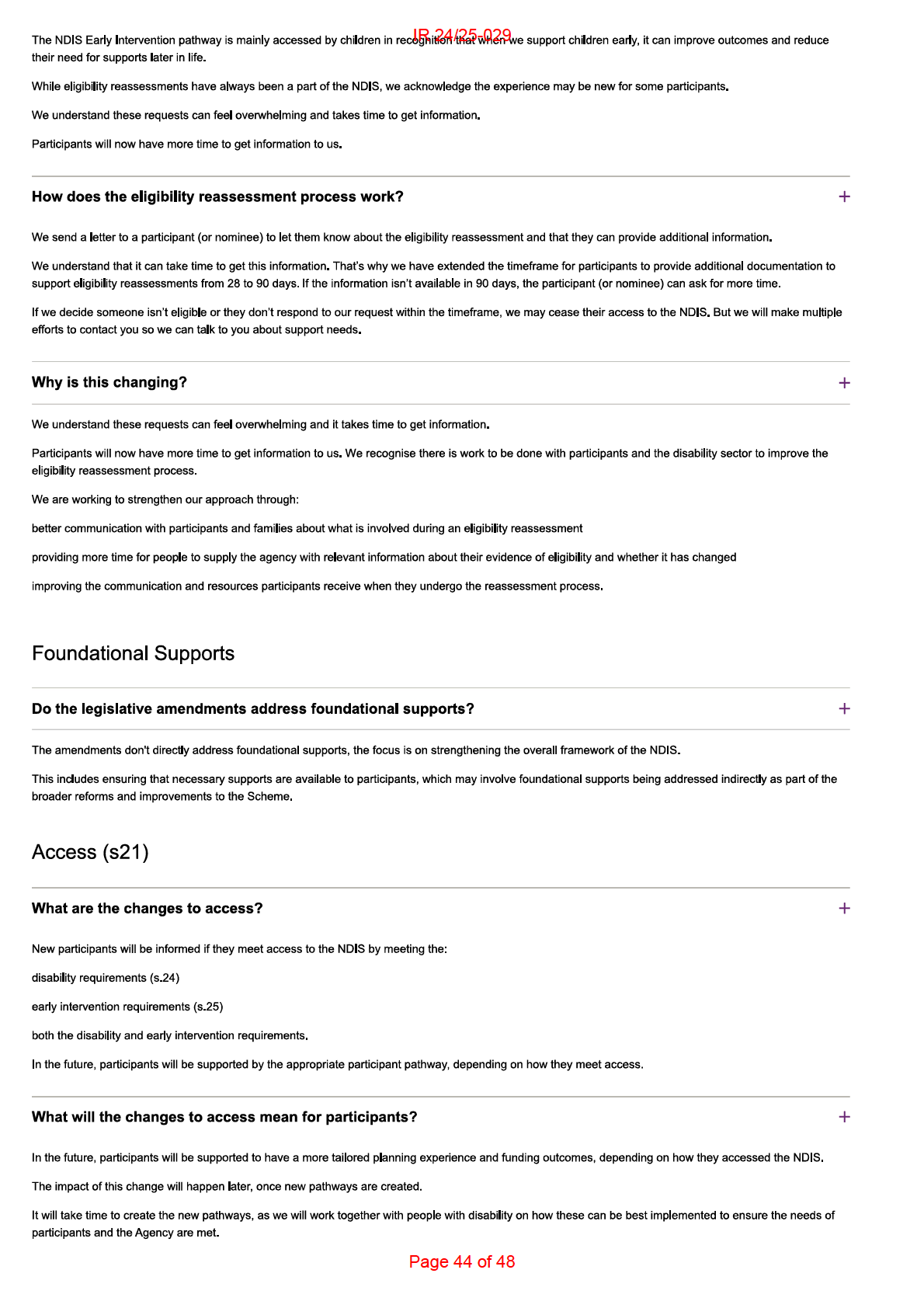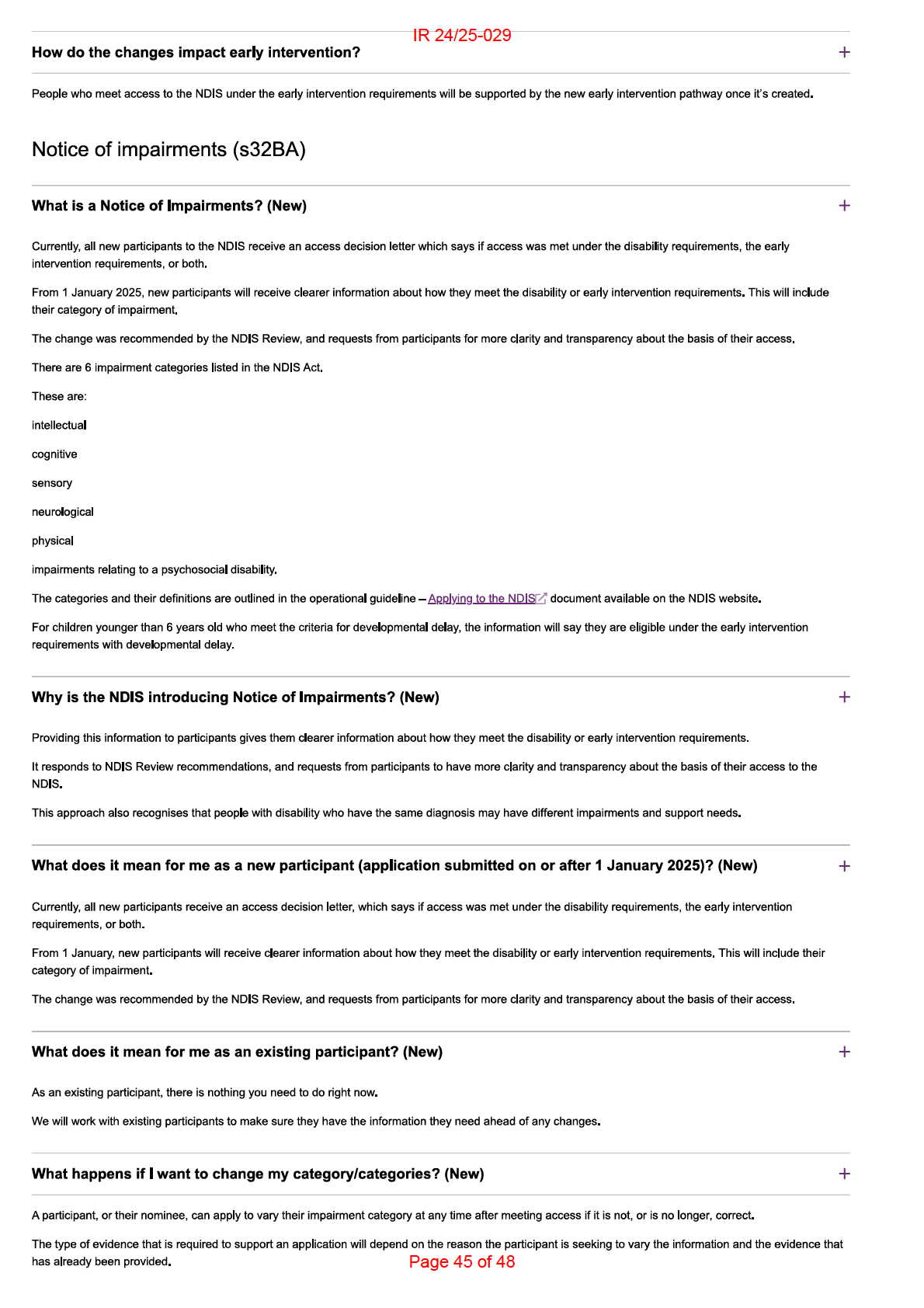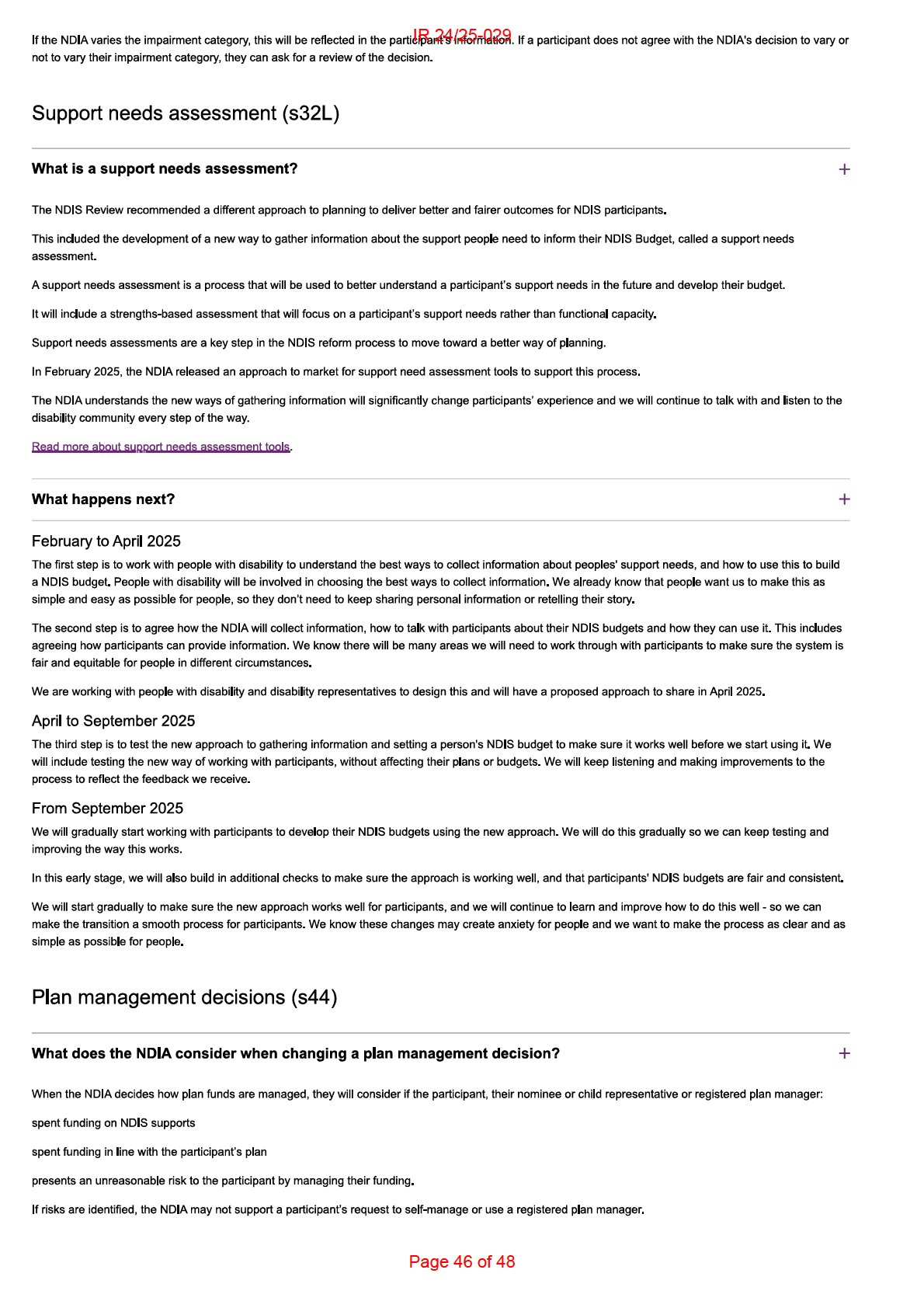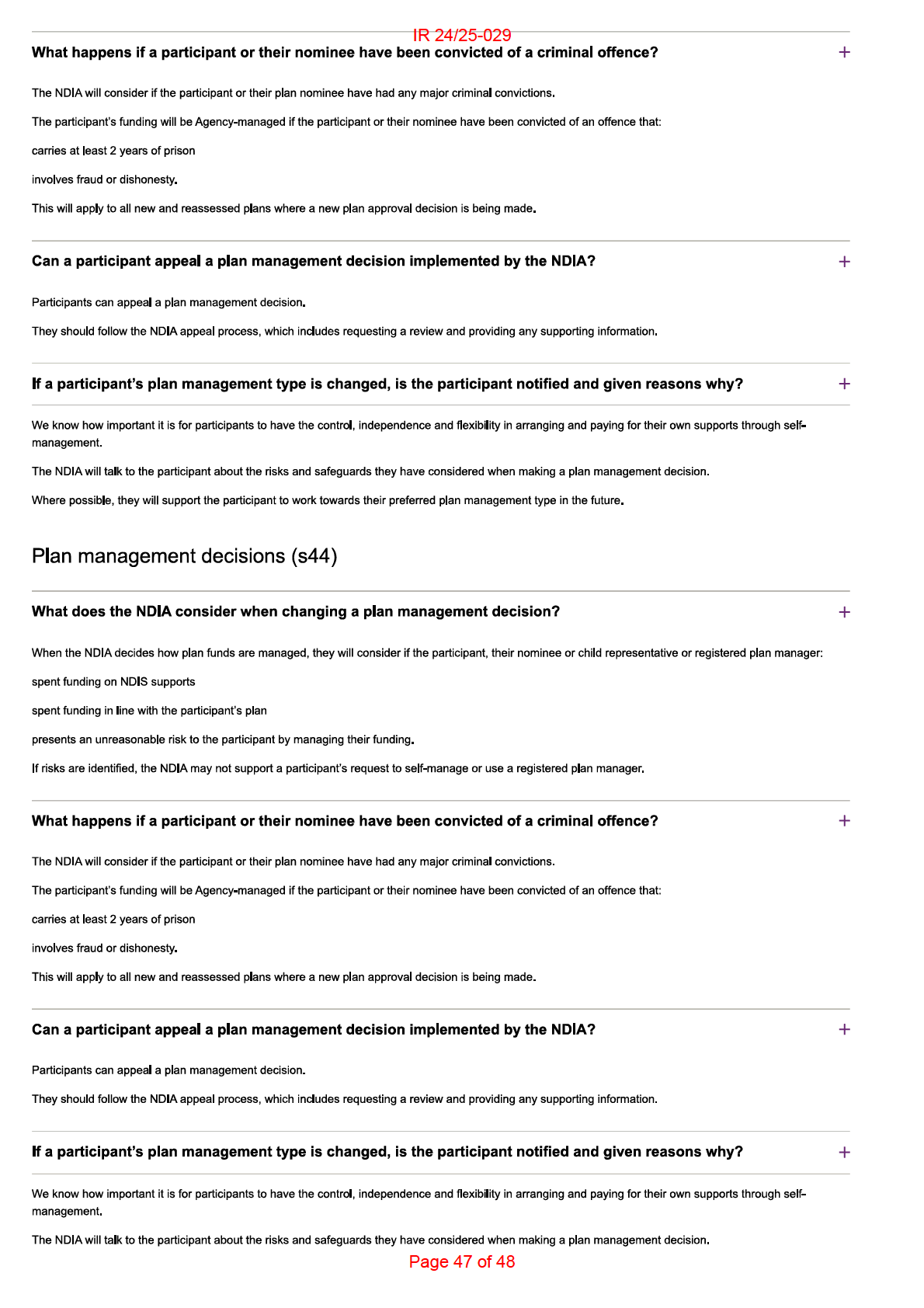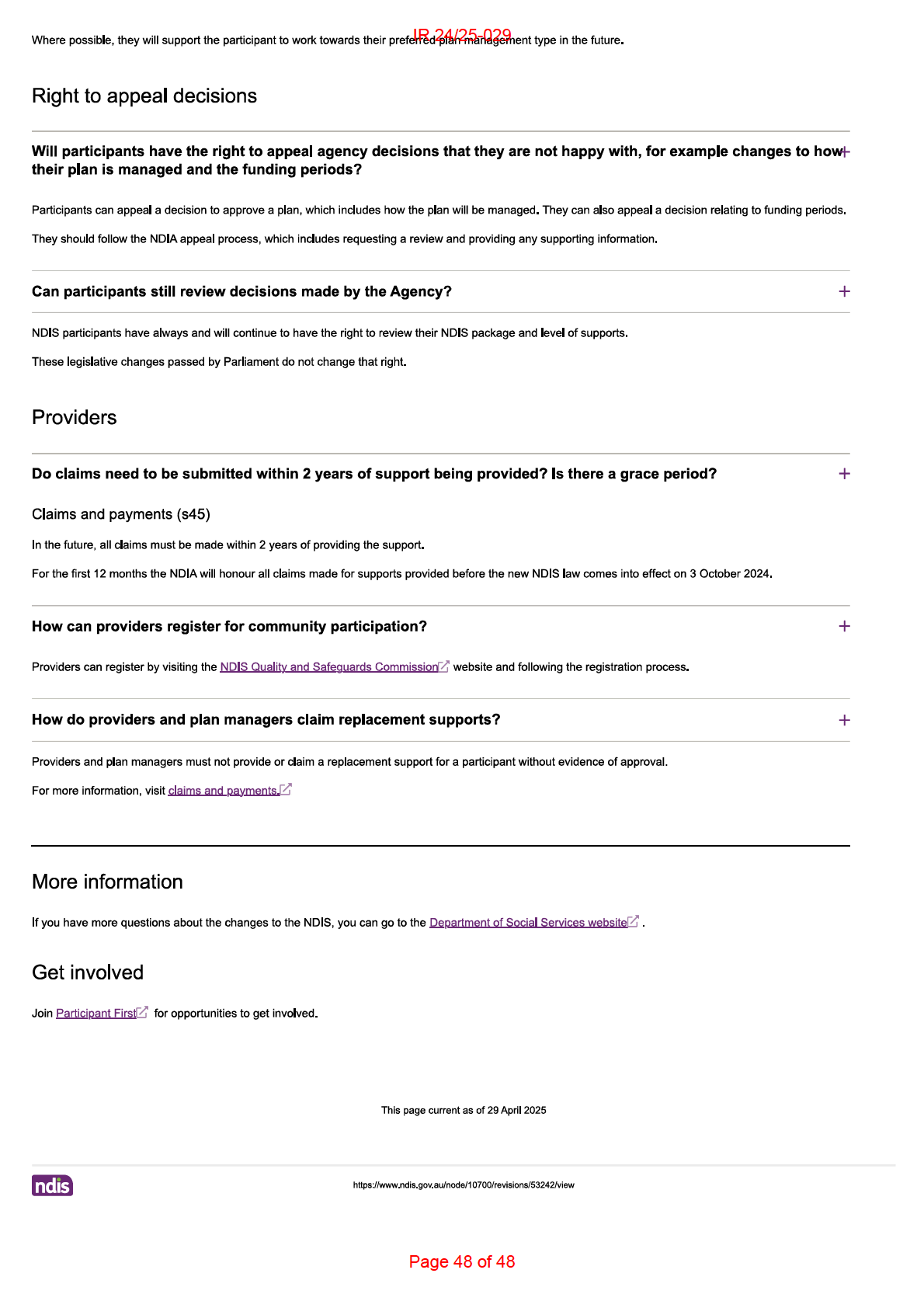link to page 1 link to page 4 link to page 5 link to page 6 link to page 17 link to page 19 link to page 20 link to page 20 link to page 21 link to page 22 link to page 23 link to page 24 link to page 24 link to page 24
DOCUMENT 1
IR 24/25-029
The Wayback Machine - https://web.archive.org/web/20250324234420/https://www.ndis.gov.au/changes-ndis-legislation/frequently-asked-questions-about-legislation
Frequently asked questions about legislation
24/03/2025, 03 04
NoticeIf Ex-Tropical Cyclone Alfred has affected you, find out how we can help.
Frequently asked questions about legislation
On this page:
New
General
Transition, future changes and co-design
NDIS supports (s10)
Budget amounts, components, periods (s33)
Eligibility reassessments (s30)
Foundational supports
Access (s21)
Notice of Impairments (s32BA)
Support needs assessment (s32L)
Plan management decisions (s44)
Plan variations and reassessments (s47 and s48)
Right to appeal decisions
Providers
New
What are flexible and stated supports? (new)
In your plan we describe NDIS support categories as flexible or stated, based on NDIS laws.
You must spend your funding in line with your plan.
Flexible supports are described generally.
Only core supports can be used flexibly but must be part of the same fund management type (external) .
Stated supports are specifically described in your plan.
This means you must use your funding to buy NDIS supports exactly how they’re described in your plan.
If you’re unsure about your stated supports, ask your my NDIS contact, support coordinator or recovery coach.
To learn more about what supports are stated and flexible, go to Factsheet: Support categories and Our Guideline - Your plan .
Are art and music therapy NDIS supports? (New)
Yes, art and music therapy are NDIS supports.
The NDIA is commissioning an Independent Review of appropriate NDIS pricing for music and art supports, based on available evidence.
The Independent Review will deliver its findings in March 2025. There will be no changes to the status of art and music as therapeutic supports, or the price for
art and music therapy until the Review has delivered its advice.
What is the purpose of the Independent Review? (New)
The NDIA is commissioning an Independent Review of appropriate NDIS pricing for music and art supports, based on available evidence.
The Independent Review will assess:
Page 1 of 48
IR 24/25-029
The review of evidence of effectiveness of art and music therapy for people with disability
Qualifications and registration of music and art practitioners
Pricing of art and music support
The Independent Review will also seek from music and art therapy associations any additional peer-reviewed evidence that the supports are effective and
beneficial as a disability-related support for most participants and are current good practice.
The Independent Review’s role and responsibility is to provide expert opinion on appropriate pricing for music and art therapy, based on existing evidence as to
whether the music and art therapy will be, or is likely to be, effective and beneficial for participants, having regard to current good practice.
How will the Independent Review impact current participants and providers? (New)
Participants and providers can continue with their current arrangements. Evidence based therapy currently allows providers to charge up to $193.99 per hour.
The Independent Review will deliver its findings in March 2025. There will be no changes to the status of art and music as therapeutic supports, or the price for
art and music therapy until the Review has delivered its advice.
Why is the NDIA updating the guidance for music and art therapy? (New)
The Agency has an obligation under the NDIS Act to ensure a support will be effective and beneficial for a participant and is current good practice.
This requires the Agency to consider the available evidence of the effectiveness of the support. For evidence-based therapy to be funded through the Scheme,
there needs to be evidence that the therapy helps participants improve or maintain their functional capacity in areas such as language and communication,
personal care, mobility and movement, interpersonal interactions, functioning, and community living.
Evidence based therapeutic supports can only be delivered by an allied health professional.
The Agency has deferred the release of the operational guidance clarifying decision making on therapy supports. Guidance will be updated in 2025 following the
Independent Review.
What is a Notice of Impairments? (New)
Currently, all new participants to the NDIS receive an access decision letter which says if access was met under the disability requirements, the early
intervention requirements, or both.
From 1 January 2025, new participants will receive clearer information about how they meet the disability or early intervention requirements. This will include
their category of impairment.
The change was recommended by the NDIS Review, and requests from participants for more clarity and transparency about the basis of their access.
There are 6 impairment categories listed in the NDIS Act.
These are:
intellectual
cognitive
sensory
neurological
physical
impairments relating to a psychosocial disability.
The categories and their definitions are outlined in the operational guideline – Applying to the NDIS document available on the NDIS website.
For children younger than 6 years old who meet the criteria for developmental delay, the information will say they are eligible under the early intervention
requirements with developmental delay.
Why is the NDIS introducing Notice of Impairments? (New)
Providing this information to participants gives them clearer information about how they meet the disability or early intervention requirements.
It responds to NDIS Review recommendations, and requests from participants to have more clarity and transparency about the basis of their access to the
NDIS.
This approach also recognises that people with disability who have the same diagnosis may have different impairments and support needs.
Page 2 of 48
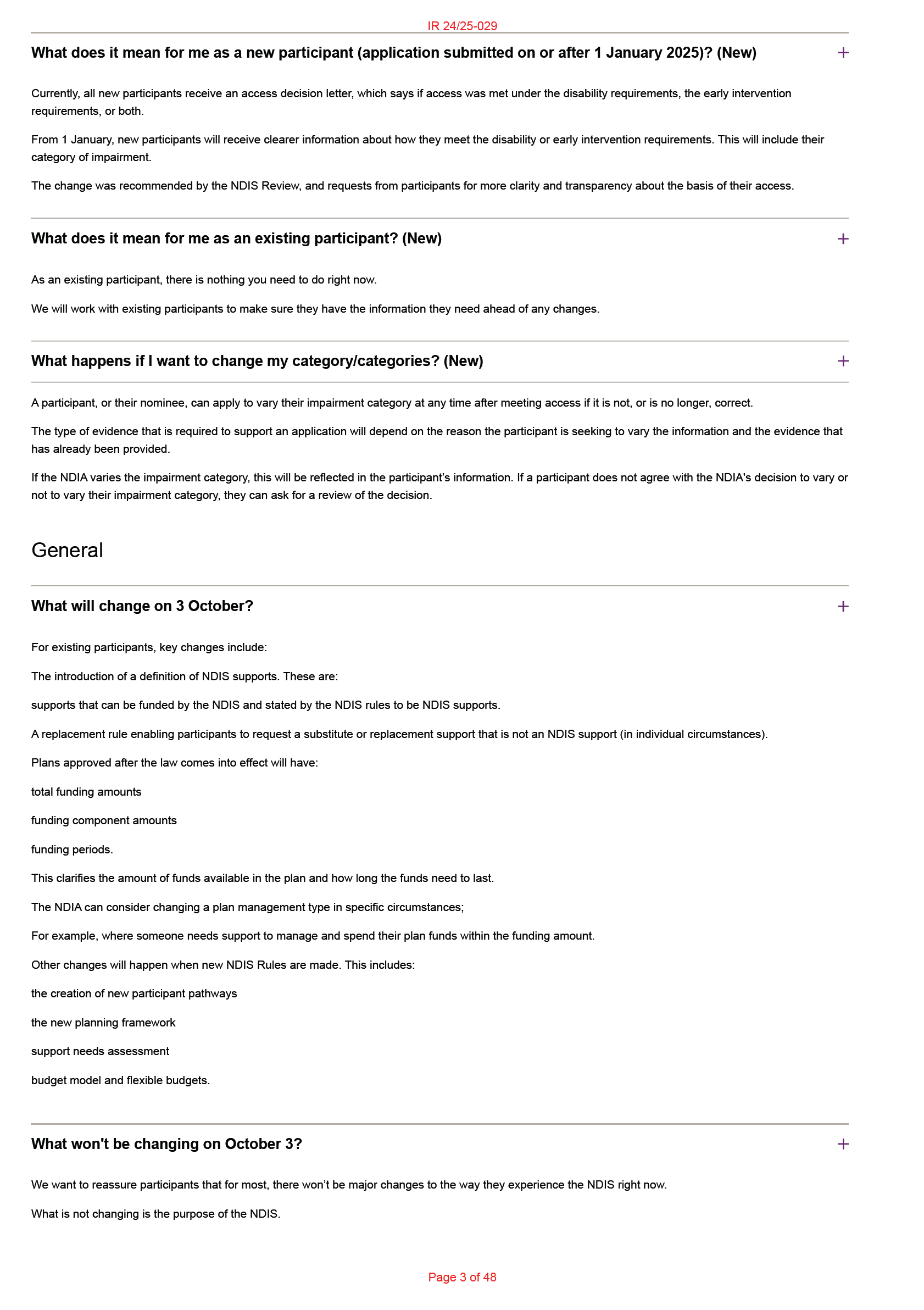
IR 24/25-029
The NDIS will continue to provide participants with disability-related supports.
What is the purpose of the new legislation?
The new legislation aims to:
Create the scaffolding needed to progress key NDIS Review recommendations in partnership with people with disability and the disability community.
Clarify the intention of existing legislation to improve the delivery of the Scheme now, reinforcing the original intent of the Scheme.
How will the new legislation affect NDIS participants?
Participants may see changes in:
how their eligibility is assessed
the supports that can be funded by the NDIS
how their plans are managed
how their funding is allocated and needs to be spent
requirements for information gathering for eligibility reassessment.
What are NDIS Rules?
The NDIS Rules sit under the NDIS Act and provide details about how the NDIS operates.
States and territories are involved in the approval process for NDIS Rules.
Legislative instruments may be made by the Minister for the NDIS after consulting with affected stakeholders.
Many of the changes to the NDIS will be implemented through new NDIS Rules.
The new NDIS Rules will outline how people can access the NDIS, what assessments are needed, and how budgets will work.
Rules will be developed with people with disability, their families and carers and the disability sector.
What is a transitional rule?
A transitional rule is a rule that the Minister for the NDIS can make within the first 12 months of the legislation being passed, ahead of final rules being agreed
with states and territories.
When will the changes take effect?
The new NDIS laws come into effect on 3 October 2024.
Some changes will happen as soon as the laws come into effect. These changes are about returning the NDIS to its original intent.
Other changes will happen later, when new NDIS Rules are made. This includes the creation of new participant pathways and the new planning framework –
support needs assessment, budget model and flexible budget.
Will there be consultation on these changes?
The changes were subject to consultation and consideration by the disability community, disability representative and carer organisations, the NDIS
Independent Advisory Council, states and territories and the Community Affairs Legislation Committee.
There will continue to be opportunities for consultation to shape how these changes are implemented. Those directly impacted by key decisions about the
Scheme will continue to play a key role in developing the detail and in implementing the reforms.
Page 4 of 48
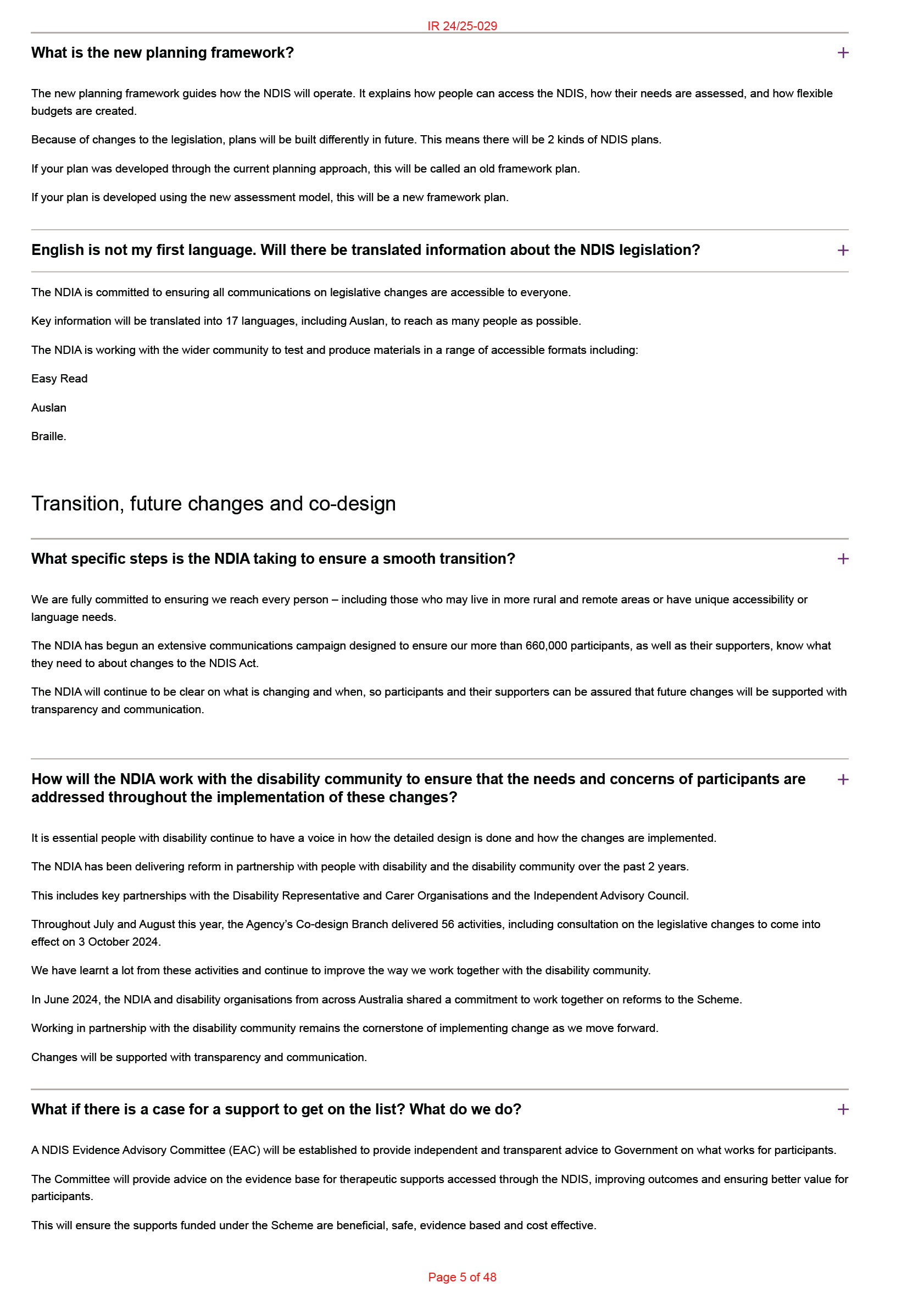
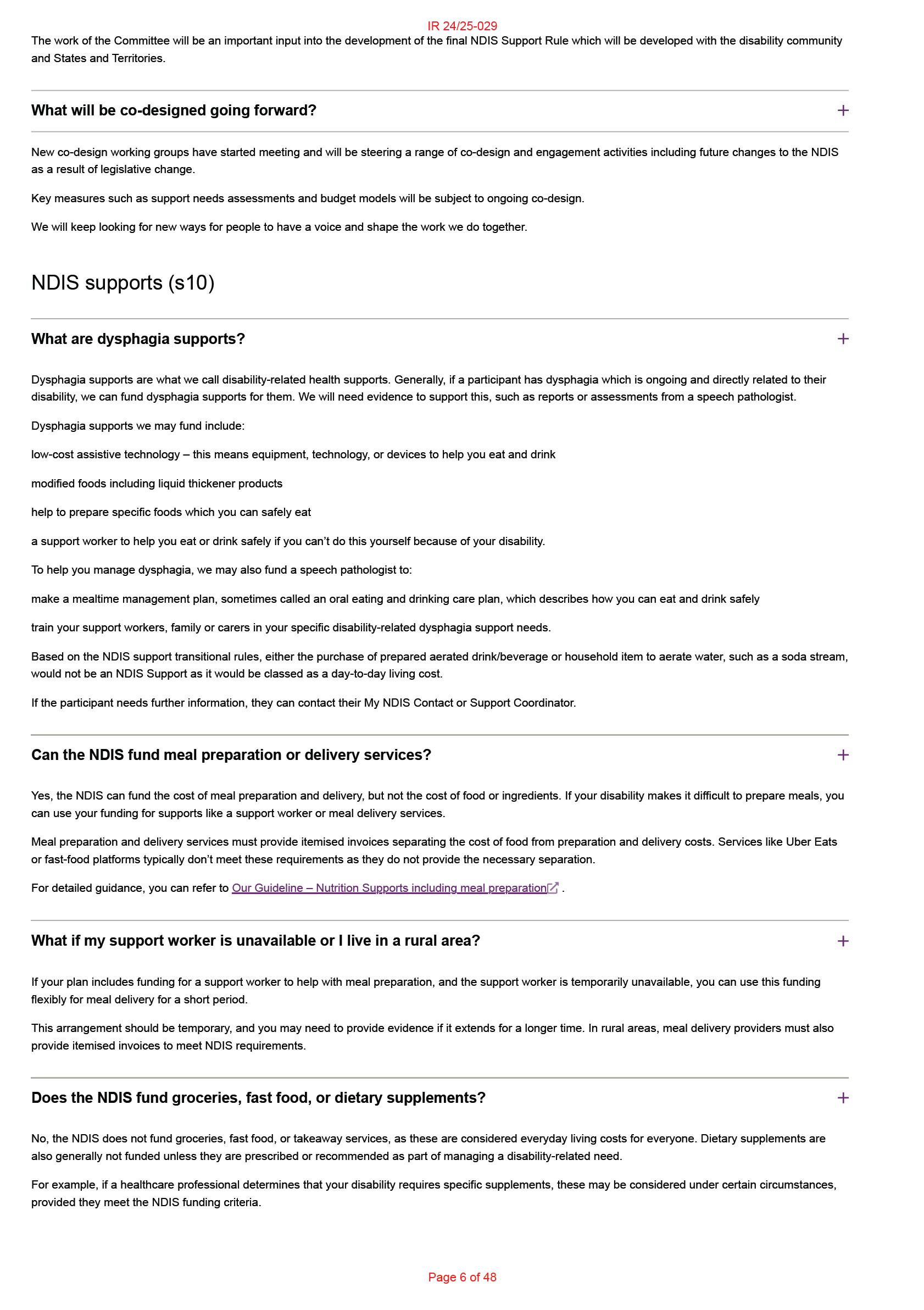
IR 24/25-029
How are decisions about meal preparation supports made, and what evidence is needed?
Decisions about funding for meal preparation supports are based on your individual plan and the NDIS funding criteria. If included in your plan, this may be as a
stated or non-stated support.
Providers must issue itemised invoices for meal preparation and delivery claims. While a quote is not usually required, if additional funding is sought or the
arrangement extends beyond a short-term period, evidence such as a recommendation or plan change request may be needed.
Are household items recommended by a qualified speech pathologist or APD on the Replacement supports list?
Are household items recommended by a qualified speech pathologist or APD on the Replacement supports list?
Standard commercially available household items are included on the Replacement support lists. Household items that are required, recommended by a
qualified speech pathologist or dietician, such as a blender to prepare a participant’s special diet would be considered a replacement item.
If a participant wishes to have these supports included in their plan they would need to apply using the Replacement support application process.
Are parenting programs funded by the NDIS?
Are parenting programs funded by the NDIS?
The NDIS funds reasonable and necessary supports to help children with disability or significant developmental delay work towards their goals.
We can only fund supports that are included in the list of Supports that are NDIS supports. We can’t fund things are that are not an NDIS support.
The new rules clarify that the NDIS does not fund general parenting programs.
By general parenting programs, we mean programs available to all parents that help build parenting skills. This approach aligns with the guidance in place
before the new legislation took effect on 3 October 2024.
What early intervention or developmental delay supports are available to children and their parents?
What early intervention or developmental delay supports are available to children and their parents?
Early intervention supports for children with disability or developmental delay focus on helping children, families, and carers work towards specific goals that are
identified in their NDIS plan.
Early intervention supports also build the family’s capacity alongside the child's. Parents and carers may participate in one-on-one, or group sessions with other
parents and carers who have similar goals within their child’s NDIS plan.
These programs are designed to build their capacity to maximise their child’s independence and development, by building the capacity and skills of the child’s
family and carers.
Parenting support can also be provided to people with disability who are parents through their NDIS plan. Where an NDIS participant who is a parent has
arrangements in their NDIS plan to support them in their parenting role because of their disability, those arrangements do not change.
Our Early Childhood Approach and Early Connections OGs outline how we help children with disability to get the support they need. We will continue to
update our guidelines as we implement legislative changes.
What is and is not a NDIS support?
From October 3 2024, the Government has released the lists of what NDIS participants can and cannot spend their funding on.
The lists include items that are NDIS supports and items that are not NDIS supports.
Participants who need specific items for their disability will still be able to access those items through these lists.
These lists are based on existing guidance, so in most cases there is unlikely to be any change to the supports a person is currently using.
There will be a transition period for the first year of the new NDIS supports lists to give participants time to learn and understand.
If you’re unsure, there are a few things you can do:
read the NDIS Supports list on the Our Guidelines website.
we'll also be sending a link to all participants
speak to your Local Area Coordinator, Early Childhood Partner or Support Coordinator
if you’re still unsure, call us on 1800 800 110.
Page 7 of 48
IR 24/25-029
How long will I get to change my supports after the legislation change?
From 3 October 2024 you must use your funding to purchase services, items and equipment that can be funded by the NDIS.
We will work with you to help you understand the new rules and access supports that are NDIS supports.
What if I am delivering supports/ accessing supports that are now on the non NDIS support list?
The Government has released definitions of NDIS supports making it clear what NDIS funds can and cannot be used for. These definitions are based on
existing guidance.
Lists of specific items that are allowable NDIS supports and those that are not allowed are on the NDIS website.
If a support is included on the list showing what is not an NDIS Support - it is not allowed to be funded from NDIS plans from 3 October 2024.
There is a transitional rule allowing participants to continue to access supports that are not NDIS supports if they were specifically identified as reasonable and
necessary before 3 October 2024, for the duration of their existing plan.
This also includes situations where the Administrative Appeals Tribunal has decided that the support should be funded as a reasonable and necessary support.
This rule does not apply to sexual services, alcohol or drugs. These supports are specified in the primary Act as non-NDIS supports.
NDIS participants will continue to receive the disability-related supports they need. However, the NDIS was not designed to pay for the cost of everyday
expenses.
Find more information on the supports lists .
How can I provide feedback or raise concerns about the changes to my support?
You can contact your local area coordinator, early childhood partner or support coordinator.
You can also contact us.
It is likely that many participants will accidentally or unknowingly use their funding on something not classified as an
NDIS support. What will happen to them, will there be a transition period to help people to adjust to the changes?
We know it will take time for people to learn about and understand the new NDIS support lists and we’ve heard participants’ concerns about what may happen if
someone accidentally buys something which is not an NDIS support.
That’s why there will be a transition period for the first year (12 months) to help people to understand the new NDIS Supports lists.
We will work with participants who make mistakes to make sure that they understand the NDIS supports lists.
What if I make a mistake and accidentally purchase a support that’s on the ‘out’ list?
A person who makes a mistake and claims an item which is not an NDIS support will not have a debt raised for first or second mistakes made in claiming where
the support is worth less than $1,500.
This means the NDIA must contact participants twice to explain what is and is not an NDIS support before any debt of less than $1,500 is raised against them.
This rule applies to all participants (including participants who self-manage their funding), nominees and child -representative for a 12-month period
commencing from 3 October 2024.
For NDIS providers, it applies for 30 days.
This does not apply if a participant purchases illegal items with funding from their plans.
If incorrect claims are repeated or fraudulent, we may take further action.
Firmer actions can include raising a debt or moving the participant onto an Agency-managed plan.
What happens with purchases over $1500?
In the situation where the cost is above $1500 the transitional rule does not apply, and a debt will be raised.
However, it is important to note that any debts related to purchases for $1,500 or more for non-NDIS supports can be written off or waived under the existing
provisions of the NDIS Act.
This includes waiver under section 195, which has been updated to allow a debt to be waived in ‘special circumstances’ if the participant unintentionally or
unknowingly breaches the Act, regulations, or rules.
Page 8 of 48
IR 24/25-029
It also allows consideration of the participant’s disability as part of a holistic assessment of whether special circumstances exist.
If a debt arises for payments made for non-NDIS supports, it will only be recovered when it is appropriate to do so in line with the Commonwealth policy on debt
recovery.
The NDIA will keep using a structured process for debt management, focusing on compliance and audit activities on repeated or intentional non-compliance.
We’ll always consider the individual circumstances, with education and support being the first consideration, particularly during the transition period.
This isn’t about trying to catch people out – we know participants want to do the right thing.
NDIA ‘Safety Net’ for debt
The NDIA has put in place a process that means if the Agency was ever to pursue a debt against a participant (in relation to section 10) – the NDIA CEO would
need to sign off this decision first.
This safety net is in place to ensure that raising any debt (in relation to section 10) against a participant would be an absolute last resort and such a decision
would never be automated, rather it would not proceed without thoughtful consideration at the most senior level of the Agency.
Purchases or provision of supports prior to 3 October 2024
Please note that the new requirement to spend NDIS amounts only on NDIS supports does not apply to any support with a service or purchase date before 3
October.
If people have made a purchase or booking for an item that is not an NDIS support before this date, they can make a claim for any cancellation fee.
This does not apply if a participant purchases illegal items with funding from their plans.
What if evidence from my treating professional states I need a support on the 'out' list?
If you think an item that isn’t a NDIS support is better for you, you can ask to substitute that support.
Only some supports can be replaced.
You can only spend your funding on a substitution if we have agreed in writing that you can buy this support.
There are a few criteria that must be met before we can approve this.
The Rules say which types of supports can be replaced.
The substituted support must also:
replace one or more supports that are NDIS supports
be the same price or cheaper than the NDIS support it is replacing, and
be likely to provide the same or better outcomes than the NDIS supports it is replacing.
You can view the NDIS supports on Our Guidelines website.
What is a replacement support?
In some specific circumstances, we can fund supports that are not NDIS supports.
We call these replacement supports.
When we say replacement support, we mean the service, item or equipment you would like to use instead of the NDIS support or supports in your plan.
Only some supports can be replaced and only if we agree in writing can you buy this support.
A replacement support isn’t an extra support. It replaces an existing NDIS support or supports in your plan.
To find out what can be considered as a replacement support, see What does NDIS fund?
When would a replacement support be requested?
We know that every participant has their own unique needs, and in specific circumstances a participant might need to use their funding for a support that is not a
NDIS support.
Participants can ask for a NDIS support to be replaced with certain non-NDIS supports. These are called replacement supports.
This will enable participants to request a replacement of their existing support with a support that is not a NDIS support.
Page 9 of 48
IR 24/25-029
This may occur in circumstances where a standard item might provide better outcomes and cost the same or less than a NDIS Support.
A replacement support may include household items, or very specific items that support a participant’s unique accessibility or communication needs.
Replacement supports must be from this pre-approved replacement supports list.
Applications can be made for the items specified below:
Standard commercially available household items
Smart watches
Tablets
smart phones
apps for accessibility/communication purposes
For more information about replacement supports including how to apply for them, see What does NDIS fund?
What’s the process for a replacement support?
To get a replacement support approved, the Agency needs to be satisfied the replacement support will provide the same or better outcomes and cost the same
or less than another NDIS support that is already in the participant’s plan.
Participants must apply for and receive approval of a replacement support before purchasing the support.
It cannot be done after purchasing a non-NDIS support.
Participants can fill out an application for a replacement support on the NDIS website or provide the same information in an email or over the phone.
If your application for a replacement support for an item is not approved, you can’t apply for that same replacement support again for 12 months.
Replacement support example
The NDIS is not designed to fund items such as an iPad or Apple watch.
However, should a participant know that they are able to communicate with their loved ones or a worker by using an iPad – rather than a specialist and more
costly piece of equipment – then they can request the Agency to fund this.
The NDIA will then consider this request and may well say ‘Yes, absolutely that makes sense – so we will fund that on this occasion’.
That’s a really clear example of replacing a more expensive item with a better, more cost-effective solution.
This just makes sense.
It’s important to note the list of replacement supports won’t apply for every participant.
The funding of a replacement support will only benefit some participants, who due to their unique circumstances, are clearly able to demonstrate that a specific
item or support, will benefit them and provide a better, more cost-effective option.
Is there someone I can ask at the NDIA to check that I am doing the right thing?
You can contact your local area coordinator, early childhood partner or support coordinator to help you understand what supports you can buy.
You can also contact us.
How will the NDIA ensure this process is easy and accessible?
We are committed to ensuring that all communications about the Government changes are accessible to everyone.
That's why we are working with the sector and our suppliers to test and produce materials in a range of accessible formats, including Easy Read documents,
animations/videos and Auslan.
An important part of our website accessibility is that content can be easily accessed, including for those using screen readers.
We are working with the sector to develop and test messaging and agile approaches to producing accessible content.
Key information will be translated into 17 languages, including Auslan, to reach as many people as possible.
Why is the change to Section 10 of the NDIS Act 2013 necessary?
We have heard consistently, particularly from participants self-managing their supports, that it is not clear what they can spend their funding on.
Page 10 of 48
IR 24/25-029
Making it clear what the NDIS does, and does not, fund will help participants make more informed choices about what they can use their funds for.
The proposed amendments to Section 10 of the NDIS Act enable the creation of new rules (Category A) that outline what is and is not an NDIS support.
It's going to take some time to make a Category A rule. We'll work closely with the disability community and state and territory governments to understand what
should and shouldn’t be included.
In the interim, the Minister may create a transitional NDIS Supports rule. This will be in place as soon as the instrument is created and will have effect until the
new Category A NDIS supports rule is agreed.
Is Short Term Accommodation (STA) an NDIS support?
Yes, short term accommodation (STA) is included in the 'supports that are NDIS supports' list.
How does STA work?
STA is designed to help informal supports continue their caring role. It is one option that provides participants and their informal supports time apart.
STA allows participants to stay away from their homes and informal supports for a short time. It can be funded for up to 14 days at a time to a maximum of 28
days per calendar year.
STA funding can be used for assistance with self-care or community access and short-term accommodation. It cannot be used to pay for day-to-day living costs
such as food and groceries, lifestyle costs or travel.
STA cannot be used to pay for items on the list of non-NDIS supports.
Providers offering STA in a centre or group residence may include meals and activities within the daily rate charged – in line with the NDIS Pricing Arrangements
and Price Limits – however these cannot be included if the participant choses to use STA in an individual setting.
We know there are still some questions about what can be claimed under STA, particularly if you want to use a hotel or other accommodation options. We are
updating our STA policy.
We will keep you updated on any changes, and further information will be shared when it is available.
How is STA funded?
STA is funded in a participant's core budget if it relates to their disability support needs, and where it is reasonable and necessary.
It does not need to be stated in a participant's plan.
Participants can access STA as part of the 'assistance with daily life tasks in a group or shared living arrangement' category on the NDIS supports list.
The NDIS funds standard rates for STA, which are available in the NDIS Pricing Arrangements and Price Limits.
Generally funding for STA is for a group price, unless there is evidence that a participant needs individual support.
STA cannot be used to pay for items on the list of non-NDIS supports.
Does STA cover the cost of transport?
Participants cannot use STA funding to pay for transport to the accommodation funded through STA.
If a participant wants to access STA supports far away from their usual home, the cost of the travel is a day-to-day living cost they are expected to pay for
separately. Participants should consider this when choosing an STA option that is right for them. Some participants may have funding for transport to an activity
or other support already in their plan. If a participant usually needs transport support because of their disability, their provider may include the cost of transport
from the accommodation to activities they provide.
Can STA be used for holidays?
No. STA is not for holidays or tourist travel. It is designed to provide participants and their informal supports time apart.
STA cannot be used to pay for items on the list of non-NDIS supports.
NDIS funding can’t be used to pay for:
cruises, holiday packages, holiday accommodation and airfares, passports, visas, or travel and vehicle insurance
accommodation or travel expenses for family members or support workers
theme parks, music, theatre, cinema, sporting events, and conferences
Page 11 of 48
IR 24/25-029
day-to-day living costs such as food or meals. In some cases, your provider may include meals as part of your STA in a centre or group setting. The NDIS funds
standard rates for STA, so you may need to negotiate these costs with your provider. Once you have used your STA funding, you can’t ask us for more. You can
find the rates in the NDIS Pricing Arrangements and Price Limits.
If a participant requires support while on holiday, they can continue to use their usual non-STA supports from their NDIS plan.
Participants should speak with their support coordinator, local area coordinator, early childhood partner or planner if they are going on a holiday and need their
NDIS supports delivered in another location.
Is STA available for participants in Supported Independent Living or living alone?
No. This is because if a participant is living alone or in a supported independent living arrangement, they already have time apart from family and informal
supports.
What are the impacts on individualised living options (ILO) in relation to rent and rental subsidies?
An ILO arrangement should be delivered in line with the ILO guideline . ILO is a package of supports to help a participant live in their chosen home
environment in a way that best suits them. It does not fund the home itself.
An ILO includes an agreed ILO service proposal and is overseen by a provider. An ILO does not include a participant’s rent or mortgage payments, or everyday
costs like food, electricity or internet bills.
If participants are living with people who offer them support throughout their day or week, and who have ILO funding in their plan and an ILO arrangement in
place, the changes to Section 10 in the Amended NDIS Act (NDIS supports) will not impact payments for these supports. The supports provided must be in line
with the participant’s ILO service proposal and the ILO Operational Guidelines and Section 10 requirements for NDIS supports .
The new NDIS transitional rules covering these supports align with existing ILO policy. They aim to ensure participants are not using their NDIS funding to pay
for their rental costs and are using their NDIS funding to purchase NDIS supports under an agreed ILO arrangement.
Participants, their families and supporters interested in considering ILO arrangements should contact the NDIS or a local area coordinator for more information.
A new policy on ILO will be developed through co-design and released mid 2025.
Is animal therapy an NDIS support?
Animal-assisted therapy can be an NDIS support - therapeutic support
Animal-assisted therapy is not the same as ‘animal therapy’. Animal-assisted therapists may use an animal to play a role in a goal-directed, structured
intervention which will assist the therapist and the participant to engage in therapy.
Animals can be used as therapy tools, just like a board game, Lego, or a swing could also be used as a tool in a therapy session.
For example, a psychologist or counsellor may use an animal in therapy sessions to assist a participant to calm, focus or regulate whilst the
counselling/psychology session is undertaken.
An occupational therapist may use an animal in therapy sessions to assist a participant to participate in an activity such as walking, standing, balancing etc. In
these interventions, the animal may be used by the therapist to help the client meet specific goals but the therapy is delivered to the participant by the allied
health professional, with the animal used to support participation.
Animal therapy is not an NDIS support.
Activities which are provided for people to have a positive experience with an animal such as engaging with puppies or riding a horse might be called ‘animal
therapy’ by the provider of the service.
Recreational, sporting or social activities involving animals could also be called animal therapy.
These activities are not animal-assisted therapeutic interventions and are not NDIS Supports, even if the provider of the service is an allied health professional.
What about supports to participate in social and recreational opportunities that include animals?
The NDIA and NDIS acknowledges that NDIS participants may engage in programs that include animals to provide sporting, social and recreational
opportunities for people with disabilities, and capacity building support.
This may include for example, participation in horse riding.
If NDIS participants need extra help to participate in horse riding activities because of their disability, the extra help can be funded in their plan.
This extra help could be a support worker or assistive products that help the participant engage in the activity when it is happening.
Page 12 of 48
IR 24/25-029
Participants might also use their therapy supports budget to work with a therapist to build their skills to do the sporting, social or recreational activity more
independently in the future.
NDIS participants will still need to pay for the general costs of their sporting, social or recreational activities as these are costs that everyone must pay for these
kinds of activities.
For example, everyone who wants an activity delivered to them has to pay for that activity themselves whether or not they have a disability.
This is the same whether the activity includes an animal or not. Participants cannot use their NDIS funding to pay for the costs of other sporting, recreational or
social activities like surfing lessons, basketball, art classes or gaming.
The bans on therapy supports like 'gaming therapy' or 'yoga therapy', does that include social group programs which
include these strategies?
Noting also that most therapists utilise some type of games in therapy sessions as standard practice, as part of building various skills.
Supports that provide evidence-based therapy to help participants improve or maintain their functional capacity in areas such as language and communication,
personal care, mobility and movement, interpersonal interactions, functioning (including psychosocial functioning) and community living are included as NDIS
supports. Evidence based therapeutic supports can only be delivered by an allied health professional.
Evidence based therapists may use a variety of tools to play a role in a goal-directed, structured intervention which will assist the therapist and the participant to
engage in therapy. This may include board games, online games, Lego or an animal. The therapy is delivered to the participant by the allied health professional
and the tool is used to support participation.
What about if my activity is delivered through a disability-specific group or centre-based program?
If your activity is being delivered through a group and centre-based program and the costs of the activity and the support you need are fully covered by the
hourly rate charged by the provider in line with the NDIS Pricing Arrangements, you can purchase your group and centre-based program using your NDIS funds.
If your group and centre-based program does not cover the costs of an activity within the hourly rate they charge to support you in that activity then you will
need to pay for the cost of the activity yourself.
For example, if your group and centre-based program goes bowling and the cost of bowling is not covered by the approved hourly rate then you need to pay for
these costs yourself.
Is Lego therapy included on the out list? Do delegates have clarity about therapy supports and which supports are
allowed?
Supports that provide evidence-based therapy, to help participants improve or maintain their functional capacity in areas such as language and communication,
personal care, mobility and movement, interpersonal interactions, functioning (including psychosocial functioning) and community living are included as NDIS
supports. Evidence-based therapeutic supports can only be delivered by an allied health professional or appropriately qualified professional.
Evidence based therapists may use a variety of tools to play a role in a goal-directed, structured intervention which will assist the therapist and the participant to
engage in therapy. This may include board games, online games, Lego or an animal. The therapy is delivered to the participant by the allied health professional
and the tool is used to support participation.
Activities that are delivered without a best quality evidence-base and/or by people who are not appropriately qualified to develop and deliver therapy are not
funded as therapeutic supports.
You can find more information about alternative and complementary therapies that are not evidence-based at What does NDIS fund?
Training on all legislative changes is being delivered to all delegates. Guidance for delegates has also been updated across NDIA systems.
Can NDIS funding be used to purchase pet insurance for assistance animals?
NDIS funding can be used to buy an assistance animal and pay for most of its associated costs when approved by the NDIA.
However, funding cannot be used to pay for pet insurance for an assistance animal. More information about assistance animals is available in Our Guideline –
Assistance animals .
NDIS funding can’t be used to buy pets or companion animals, or to pay for any pet or companion animal related costs including:
Pet food, toys or accessories
Veterinarian costs
Pet boarding
Pet grooming
Pet insurance
Page 13 of 48
IR 24/25-029
Taxidermy and pet cremations, burials or funerals.
Is specialised driver training an NDIS support?
The NDIS supports list describes that driver training with a specialised vehicle driving instructor can be funded for eligible participants.
A specialised vehicle driving instructor is someone who has experience and training in providing driving instruction to people with disability and is registered or
licensed to be a driving instructor in the relevant State or Territory.
The information available in current operational guidance remains applicable.
Our Guideline – Vehicle modifications and driving supports describes the range of driver supports that may be funded:
A driver trained occupational therapist assessment and a driving instructor for the on-road part of the assessment, if a participant plans to drive the vehicle.
Specialised driving lessons - additional driving lessons where a participant’s disability impacts their ability to learn to drive.
Are disability specific bicycles, including electric bicycles, considered an NDIS support?
Yes. Bicycles or tricycles, with or without an electric motor, that include disability specific features, or have been designed to meet the disability specific needs of
a participant, are an NDIS support.
This is because they are considered an assistive product for recreation and can be funded if they also meet the ‘reasonable and necessary’ criteria applied to all
NDIS supports.
The costs associated with adapting or modifying a standard bicycle or tricycle to meet a participant’s disability specific needs may also be an NDIS support.
However, in these circumstances the participant, or their family, would need to self-fund the cost of the bicycle or tricycle that is being adapted or modified.
Standard, non-modified, bicycles or tricycles including electric bicycles are not NDIS supports.
In some specific circumstances, the NDIS may fund supports that are not listed as NDIS supports. These are called replacement supports. Electric bicycles are
not considered standard commercially available household items and therefore are not a support for which a replacement can be requested.
Are sexual services an NDIS support?
Under the laws of the NDIS sexual services can’t be funded.
Sexual services is not defined in the legislation but is given its ordinary meaning by the NDIA.
Sexual services are taken to include any sexual conduct undertaken with a participant for payment or reward, including direct physical activity between a
participant and another person for the purpose of sexual gratification.
This includes all services that may be provided by a sex worker.
The NDIS will continue to provide reasonable and necessary funding to participants to access the disability related supports and services they need.
This includes other sexuality related supports due to a participant’s disability, for example adaptive equipment, sex counselling and individualised sexual
education supports where reasonable and necessary.
How does the allowable NDIS supports list work?
The list of allowable NDIS supports is not exhaustive, meaning it does not exclude items that are not specifically listed.
The purpose of the list is to clarify the types of supports that fall under the overarching description.
It is important for participants to know that for something to be considered an NDIS support, it must fit within the overarching description provided in schedule 1
(however it does not have to be specifically listed) and of course, must not be included in the non-allowable NDIS supports list.
The NDIS support list includes high intensity daily personal activities, and states that supports must be provided by
a worker with additional qualifications and experience. What does this mean?
You should ensure that the people providing your high intensity daily personal activity supports have relevant qualifications and/or training to deliver the support
to you safely and appropriately.
The NDIS Quality and Safeguards Commission provides guidance which describes the skills and knowledge that NDIS providers and workers should ensure
they have when supporting participants receiving high intensity daily personal activities.
Page 14 of 48
IR 24/25-029
You can find more information about this guidance on the NDIS Commission website .
Are modified fluids and thickeners NDIS supports?
Modified fluids and thickeners are NDIS supports.They are what we call disability-related health supports .
These include:
low-cost assistive technology – equipment, technology, or devices to assist with feeding and swallowing needs
modified foods including liquid thickener products
help to prepare specific foods which you can safely eat
a support worker to help you eat or drink safely if you can’t do this yourself because of your disability.
Are dietetics/dietitians NDIS supports?
As an evidence-based therapy, dietetics is covered under ‘Therapeutic supports ’.
The list of supports detailed under each category in the list of Supports that are NDIS supports is not exhaustive.
The NDIS will fund dietetics where the participant needs this therapeutic support due to their disability and it meets the reasonable and necessary test.
The NDIS Pricing Arrangements 2024-25 (PAPL) includes dietetics under the ‘Capacity Building – Improved Health and Wellbeing’ category (pg. 81-82).
The PAPL is currently being reviewed and will be updated to be consistent with current practice.
Would food processors and aerators be considered exemptions to the supports that are not NDIS supports list?
Based on the NDIS Transitional Rules 2024, food processers, including the purchase of prepared aerated drink/beverage or household item to aerate water,
such as a soda stream, are not NDIS supports.
These are classed as a day-to-day living costs.
What are dysphagia supports? (New)
Dysphagia supports are what we call disability-related health supports. Generally, if a participant has dysphagia which is ongoing and directly related to their
disability, we can fund dysphagia supports for them. We will need evidence to support this, such as reports or assessments from a speech pathologist.
Dysphagia supports we may fund include:
low-cost assistive technology – this means equipment, technology, or devices to help you eat and drink
modified foods including liquid thickener products
help to prepare specific foods which you can safely eat
a support worker to help you eat or drink safely if you can’t do this yourself because of your disability.
To help you manage dysphagia, we may also fund a speech pathologist to:
make a mealtime management plan, sometimes called an oral eating and drinking care plan, which describes how you can eat and drink safely
train your support workers, family or carers in your specific disability-related dysphagia support needs.
Based on the NDIS support transitional rules, either the purchase of prepared aerated drink/beverage or household item to aerate water, such as a soda stream,
would not be an NDIS Support as it would be classed as a day-to-day living cost.
If the participant needs further information, they can contact their My NDIS Contact or Support Coordinator.
Can the NDIS fund meal preparation or delivery services? (New)
Yes, the NDIS can fund the cost of meal preparation and delivery, but not the cost of food or ingredients. If your disability makes it difficult to prepare meals, you
can use your funding for supports like a support worker or meal delivery services.
Meal preparation and delivery services must provide itemised invoices separating the cost of food from preparation and delivery costs. Services like Uber Eats
or fast-food platforms typically don’t meet these requirements as they do not provide the necessary separation.
For detailed guidance, you can refer to Our Guideline – Nutrition Supports including meal preparation .
Page 15 of 48
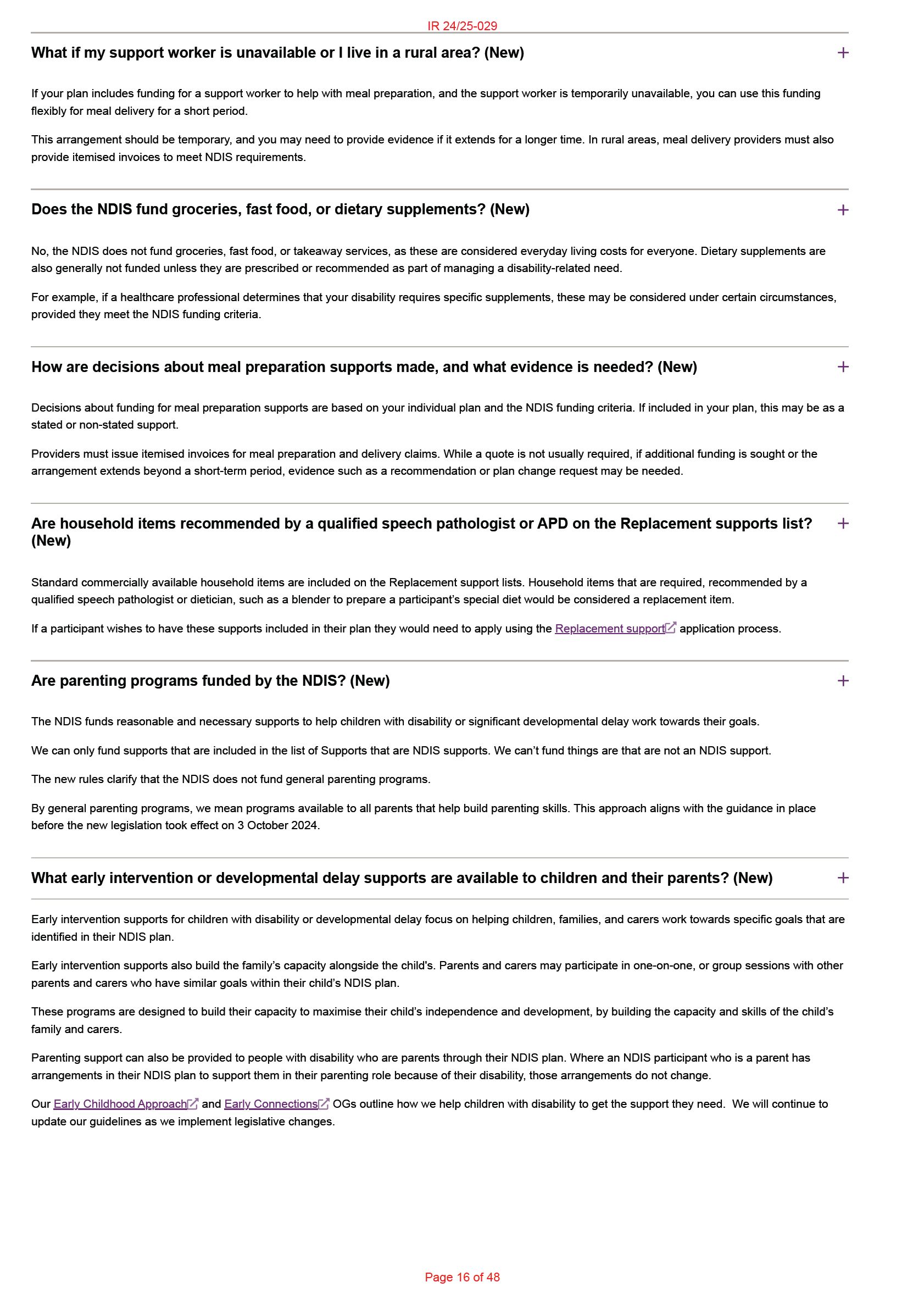
IR 24/25-029
Budget amounts, components, periods (s33)
When does this apply?
NDIS plans approved after 3 October 2024 will specify a total budget amount for all supports across the length of the plan.
This will not affect current plans. The change will be applied to new plans on approval.
What are funding periods?
Currently participants can access all the funding in their plan at any time.
This can make it hard for participants to budget and can also make them vulnerable.
In the future, for participants with stable support needs, the introduction of funding periods allows for the creation of longer-term plans, for instance 2, 3 or 5
years.
For now, all new plans created after 3 October 2024 will have a funding period of 12 months.
Funding periods define how often a participant can access a portion of their total budget amount or funding component amounts.
This helps avoid plan inflation and manage risk.
Unspent funds will roll-over between funding periods within the same plan.
This approach ensures that support is available as needed over time.
This will make it easier for participants to spend in accordance with their plan.
Participants will know how much funds they have, what amount for what component and how long the funds need to last.
What is total budget amount?
Plans will include a total budget amount showing the total cost of all supports across the length of the plan.
There will be tools available for participants to help manage their budgets.
When the law first comes into effect on 3 October 2024, all funding periods will be 12 months.
From early 2025, shorter funding periods will be available for those who need them.
This will make it easier for participants to spend in accordance with their plan.
They will know how much funds they have, and how long the funds need to last.
Can unused funding be rolled over to the next funding period?
Any unused funding will roll-over between funding periods within a plan.
Unused funding will not roll-over into new plans.
Can funding from a future funding period be brought forward?
Future funding periods cannot be brought forward.
If you are running out of funding due to a change in your circumstances, you can contact the NDIS to request a review of your plan.
Who decides what the funding period will be?
Funding periods will be discussed with participants during the planning process.
They will be determined by a range of factors including:
personal preference
frequency and type of supports
potential risks.
Page 17 of 48
IR 24/25-029
The NDIA will consider funding periods with participants when deciding how their plans funds are managed.
Can participants request a review of a decision about the funding periods and total budget amounts in their plan?
If a participant is not happy with the funding periods and total budget amounts in their plan, they can request an internal review of their plan.
Why is capacity building not flexible with core?
The legislation and legislative instrument state only a small number of things are stated supports. So everything else should be flexible?
The way plans are built and funding allocated across core, capacity building and capital budgets is not changing until the new planning framework commences.
This includes no changes to flexibility within and across these budgets.
How will people who are Agency-managed have the same level of support and choice?
How can participants make sure funding components are being utilised as flexibly as possible, especially when we don't have clarity around supported decision-
making approaches?
Generally speaking, funding components will act the same as budgets and support categories now, so participants shouldn’t experience any changes to how
flexible their plans are.
There are no changes regarding access to registered or unregistered providers as a result of the legislation changes.
We will help participants and nominees understand these changes and implement their plans. Participants can continue to access plan implementation support
from their My NDIS Contact or, support coordinator, plan manager or other services such as recovery coaches if they are funded in their plan. Plan managers
and support coordinators are expected to provide assistance to the participant to understand their funding options and choices.
If the participant needs additional assistance because of their supported decision making needs, they can ask for capacity building funding in their plan.
If participants want to access more flexibility with the ability to choose unregistered providers, they can have a discussion about their plan management type
with their planner or local area coordinator.
Each plan can continue to have a mix of plan management types based on an individual participant’s needs and preferences.
Training for NDIA staff on supported decision making has been designed and will begin to be delivered from November 2024. This will assist planners to
prioritise supported decision making when having discussions with participants.
Can a participant negotiate to 'unstate' a support during planning?
The purpose of stating supports in a participant’s plan is to ensure specific disability needs are addressed.
It is therefore not something that would generally be changed in the planning process.
Is there going to be enough flexibility in these arrangements to enable plans to work for people with volatile needs?
It may be about making a best guess with initial funding or a quick turnaround on change requests, but standard approaches for all participants may not apply
for this group.
The way plans are built and funding allocated across core, capacity building and capital budgets is not changing until the new planning framework commences.
This includes no changes to flexibility within and across these budgets.
Participants will continue to be able to make change requests when their circumstances change. This includes requesting a variation for crisis or emergency
funding as a result of a significant change to the participant's support needs.
As well as there being s10 rules around allowable supports in place, will there be any restrictions on choice of
registered providers for home and living supports?
The NDIS Provider and Worker Registration Taskforce recently provided advice to the Government on the design and implementation of a new regulatory
model.
The Taskforce made 11 recommendations and 10 implementation actions covering provider and worker registration, some of which required an immediate
response and others that will be designed with close consultation with the disability community. The Taskforce conducted thorough consultation, and this
important process will continue.
The NDIS Quality and Safeguards Commission will progress Rule changes to mandate registration for support coordination, platform providers and SIL.
Consultation on these changes will commence shortly. The new Rules will allow for a period of transition to the new mandatory registration arrangements.
Currently, if a participant’s plan is Agency-managed, there are some constraints in place, including that they must purchase from registered NDIS providers only.
Page 18 of 48
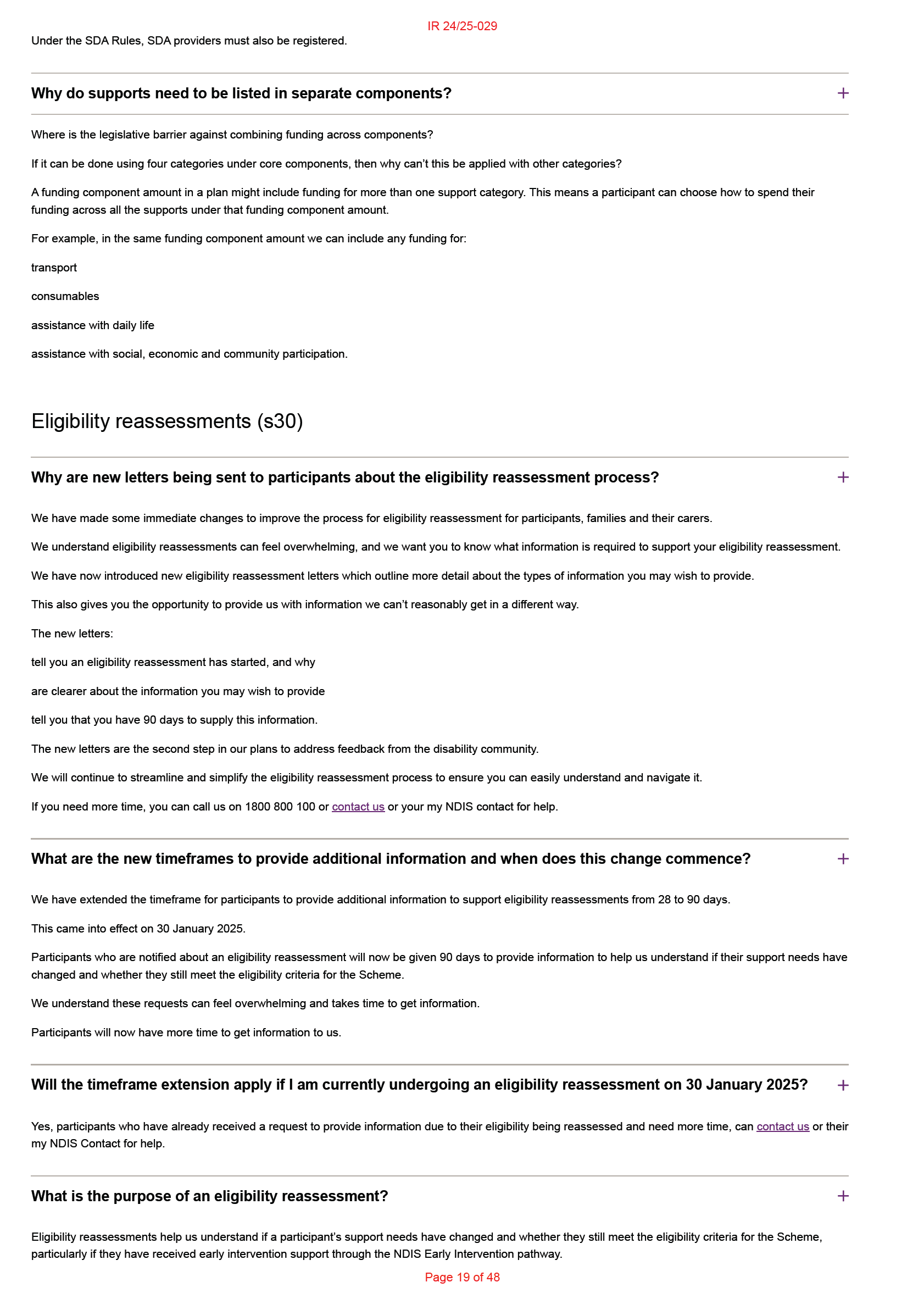
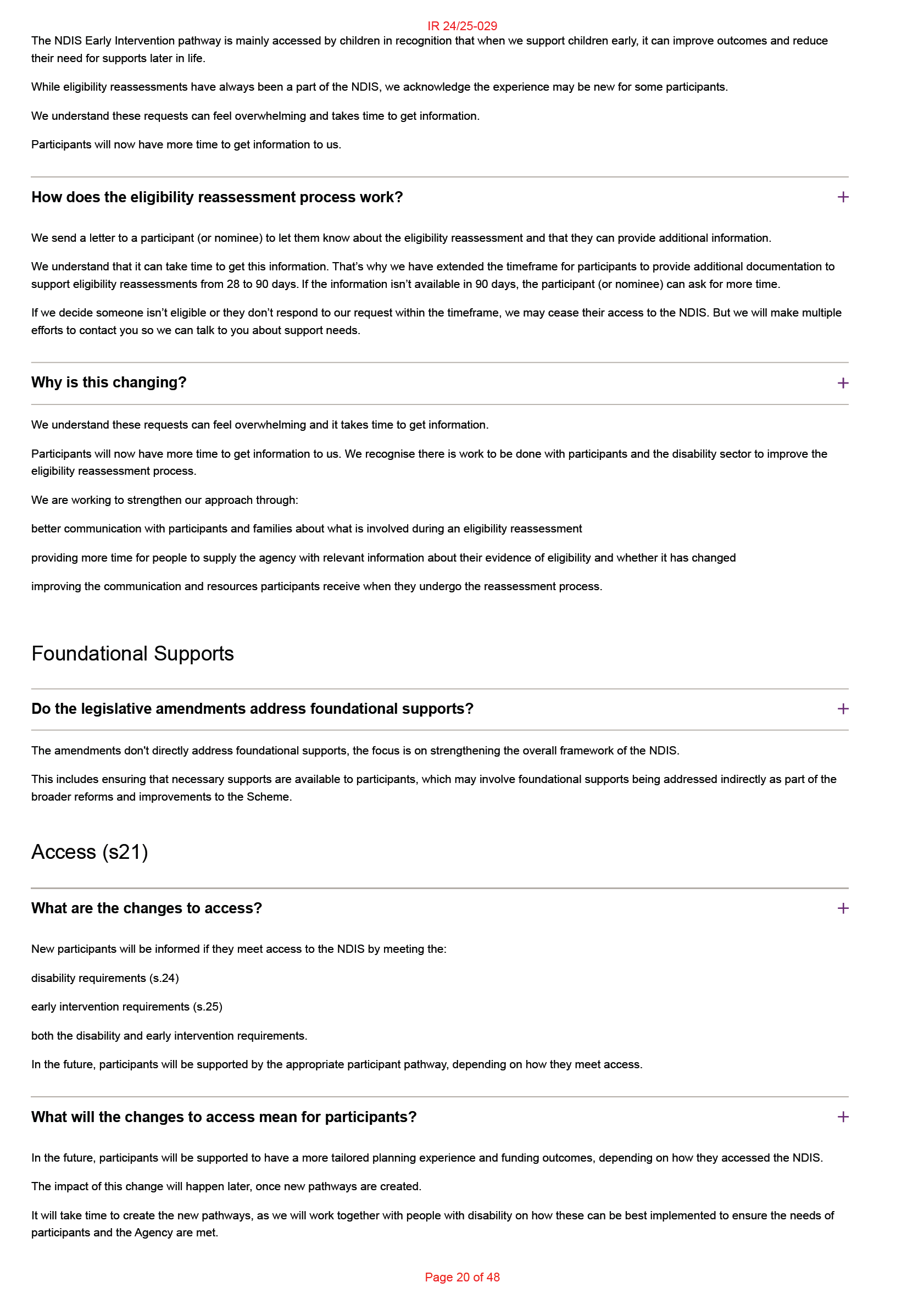
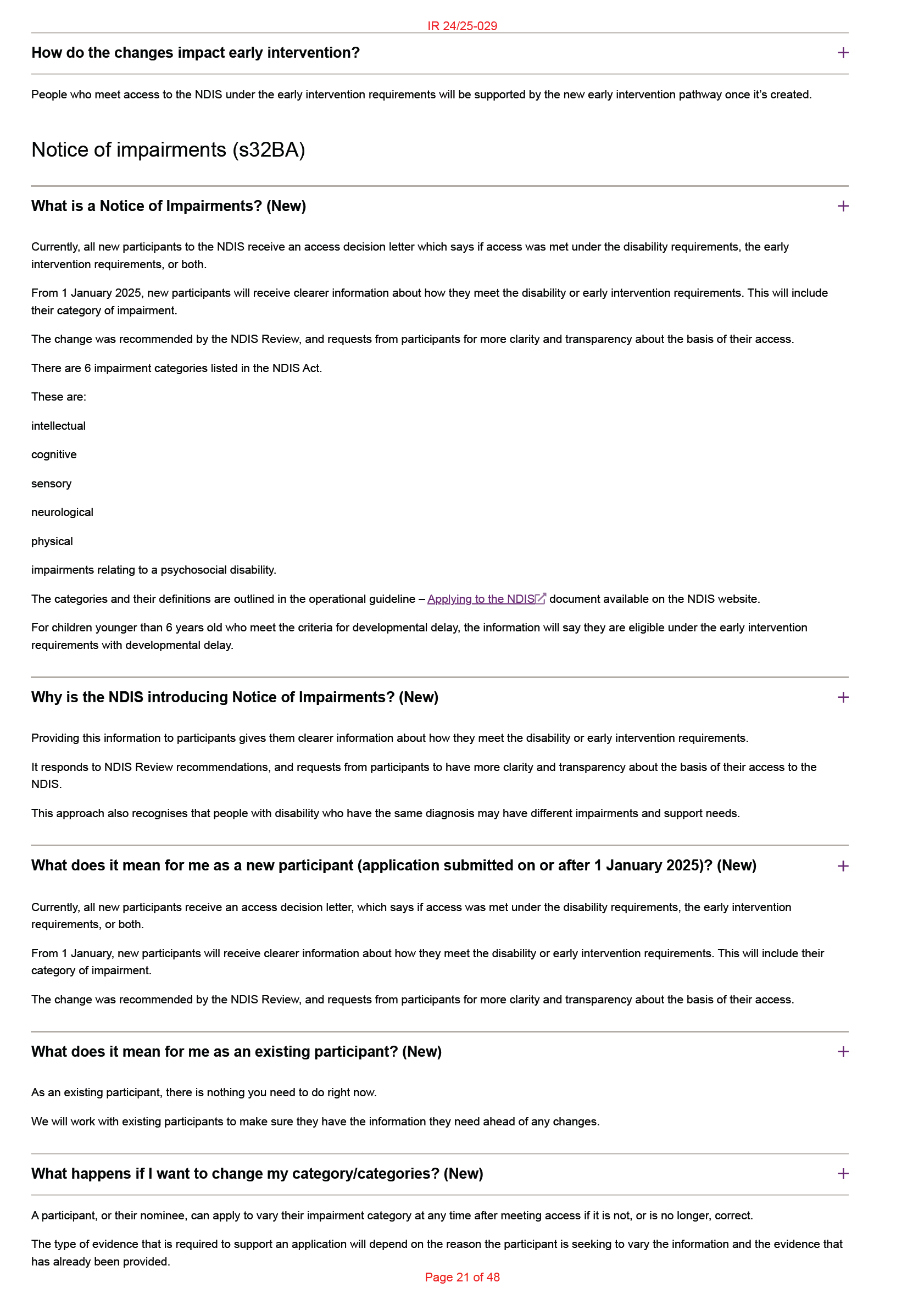
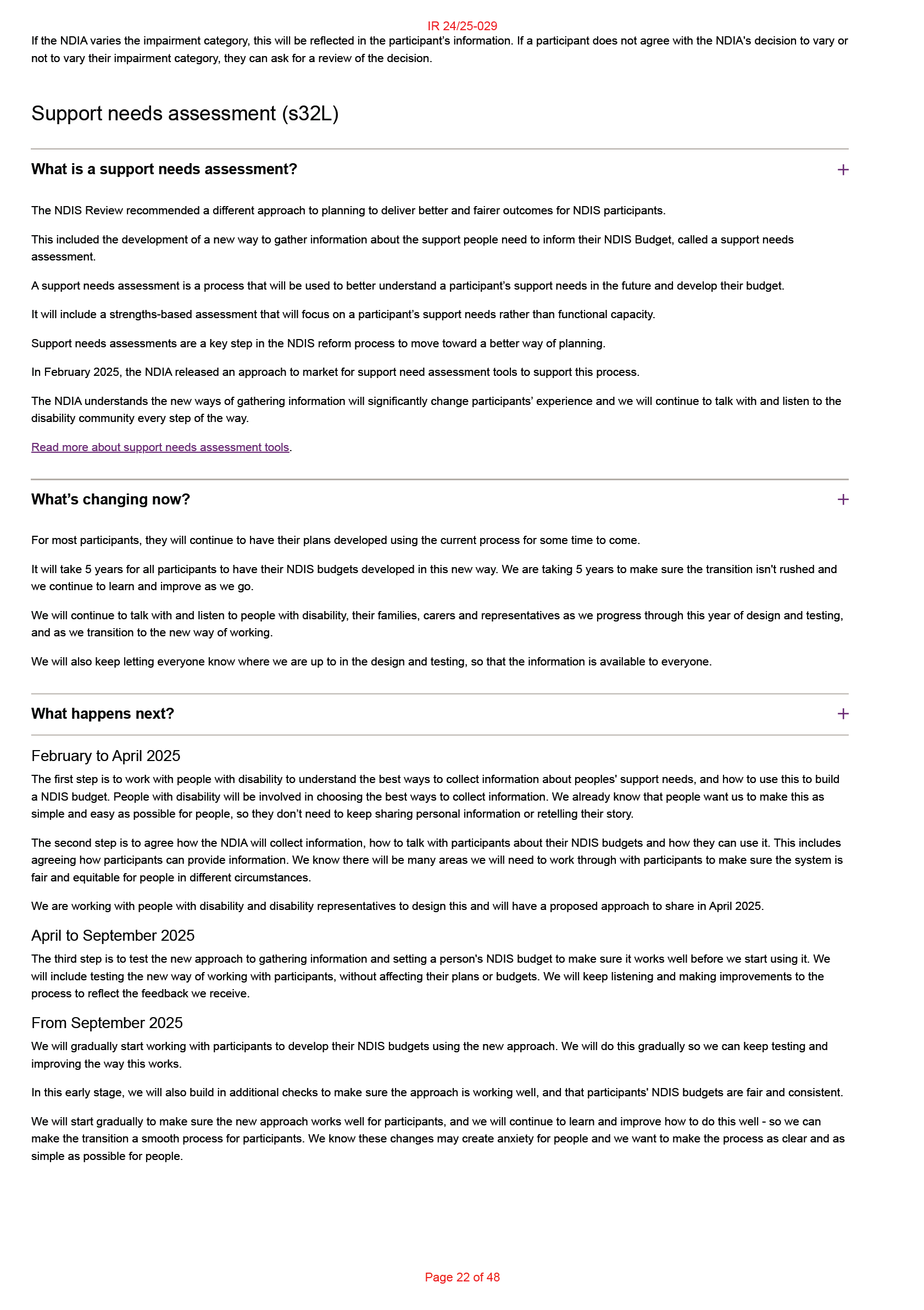
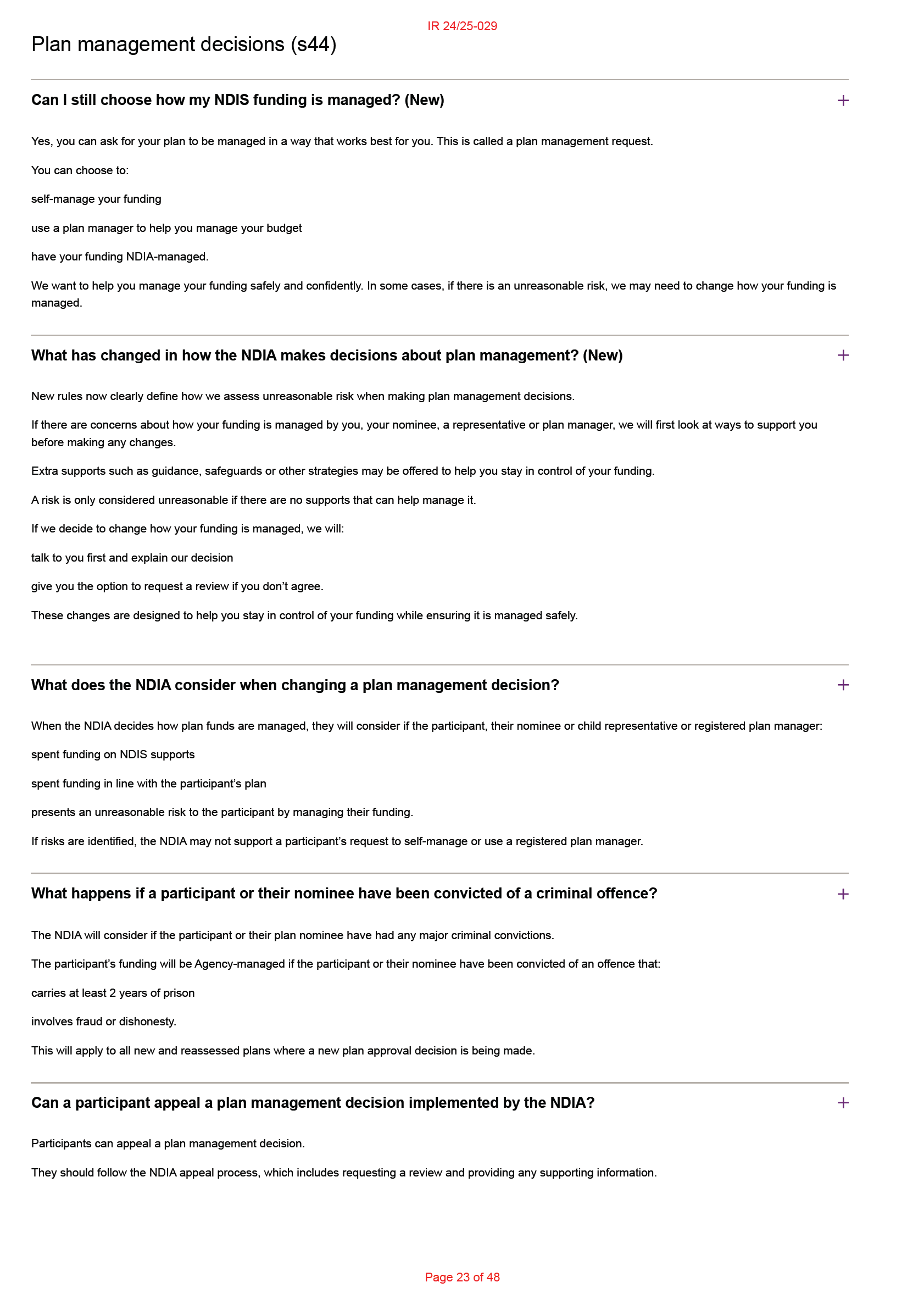
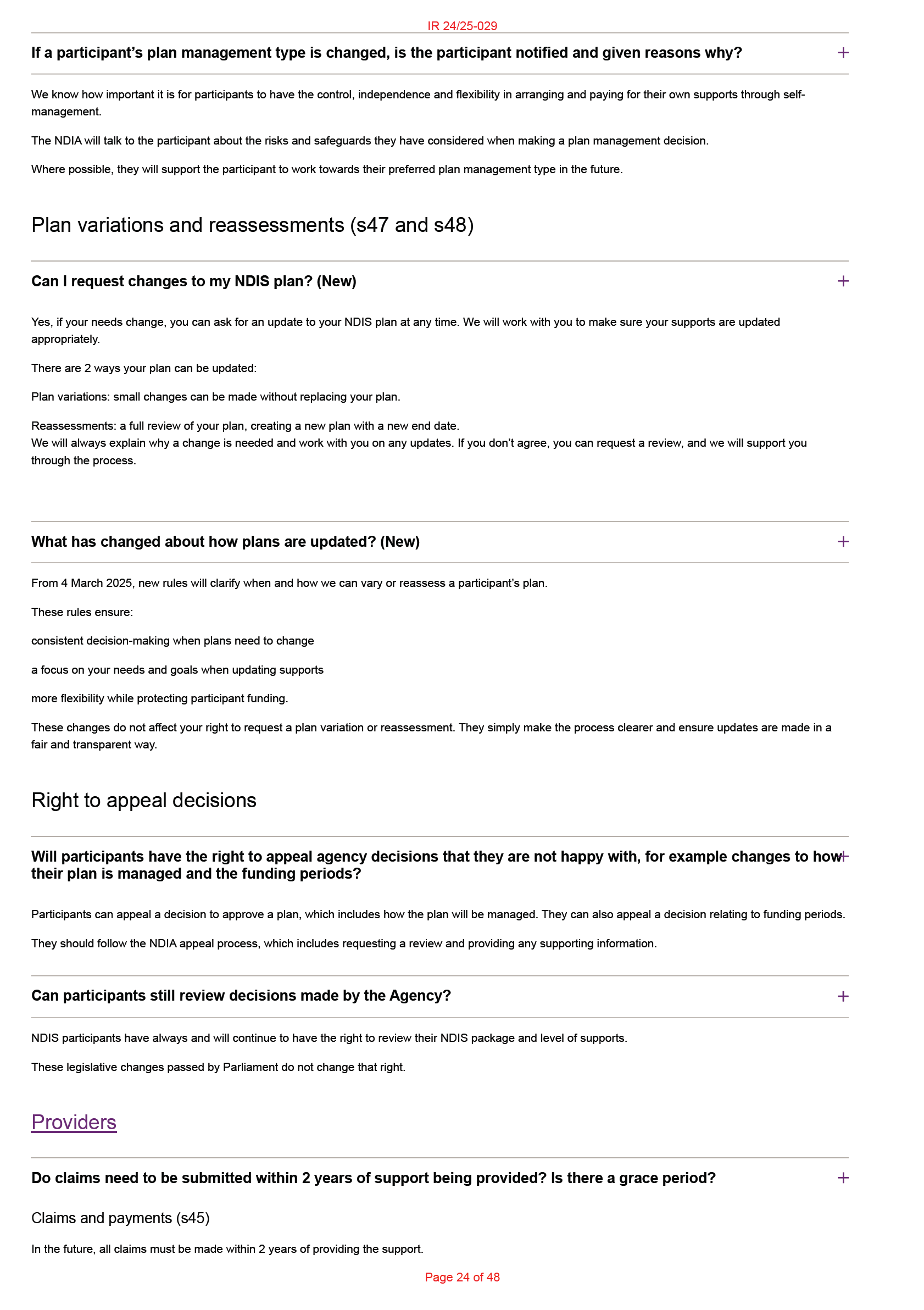
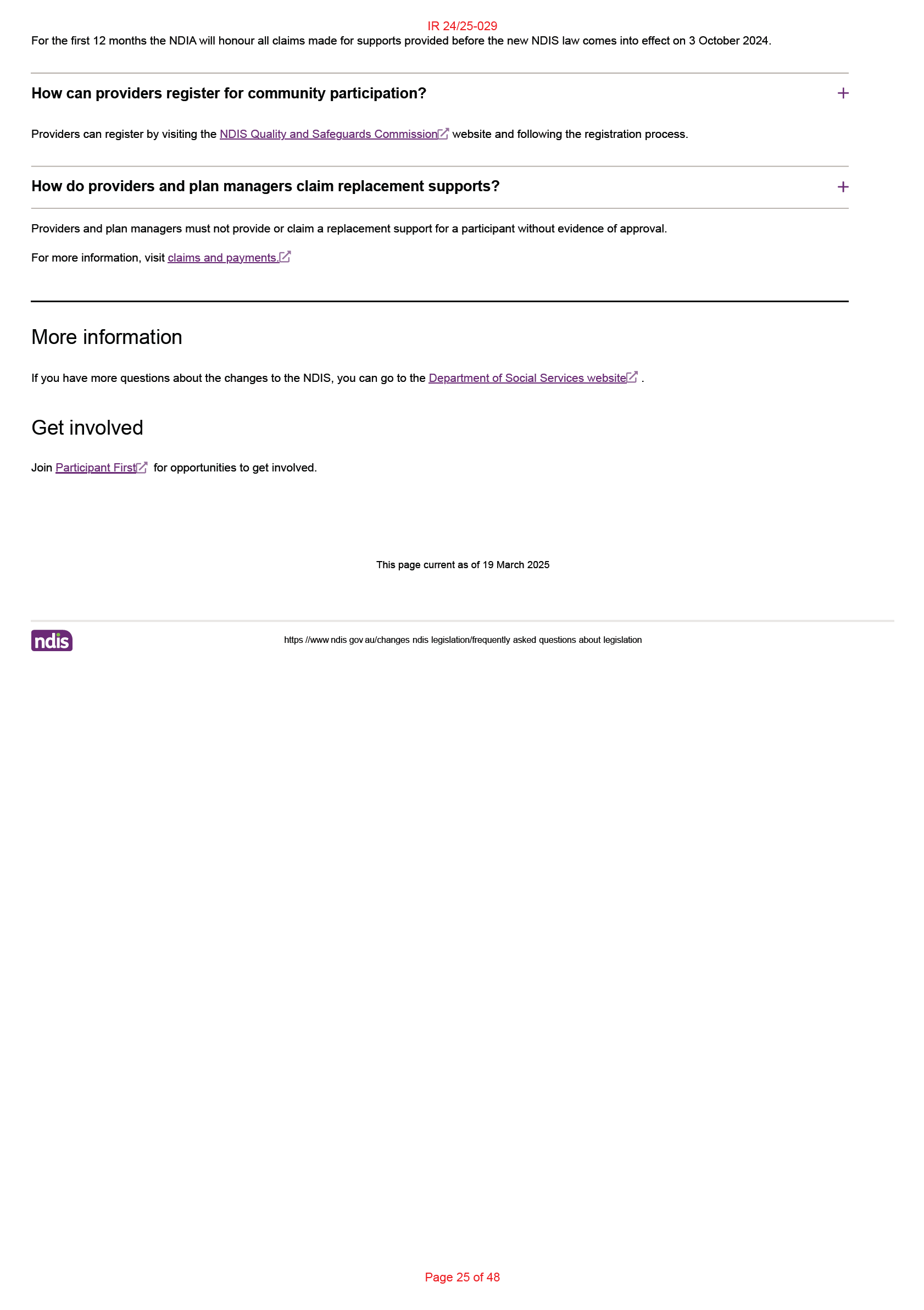
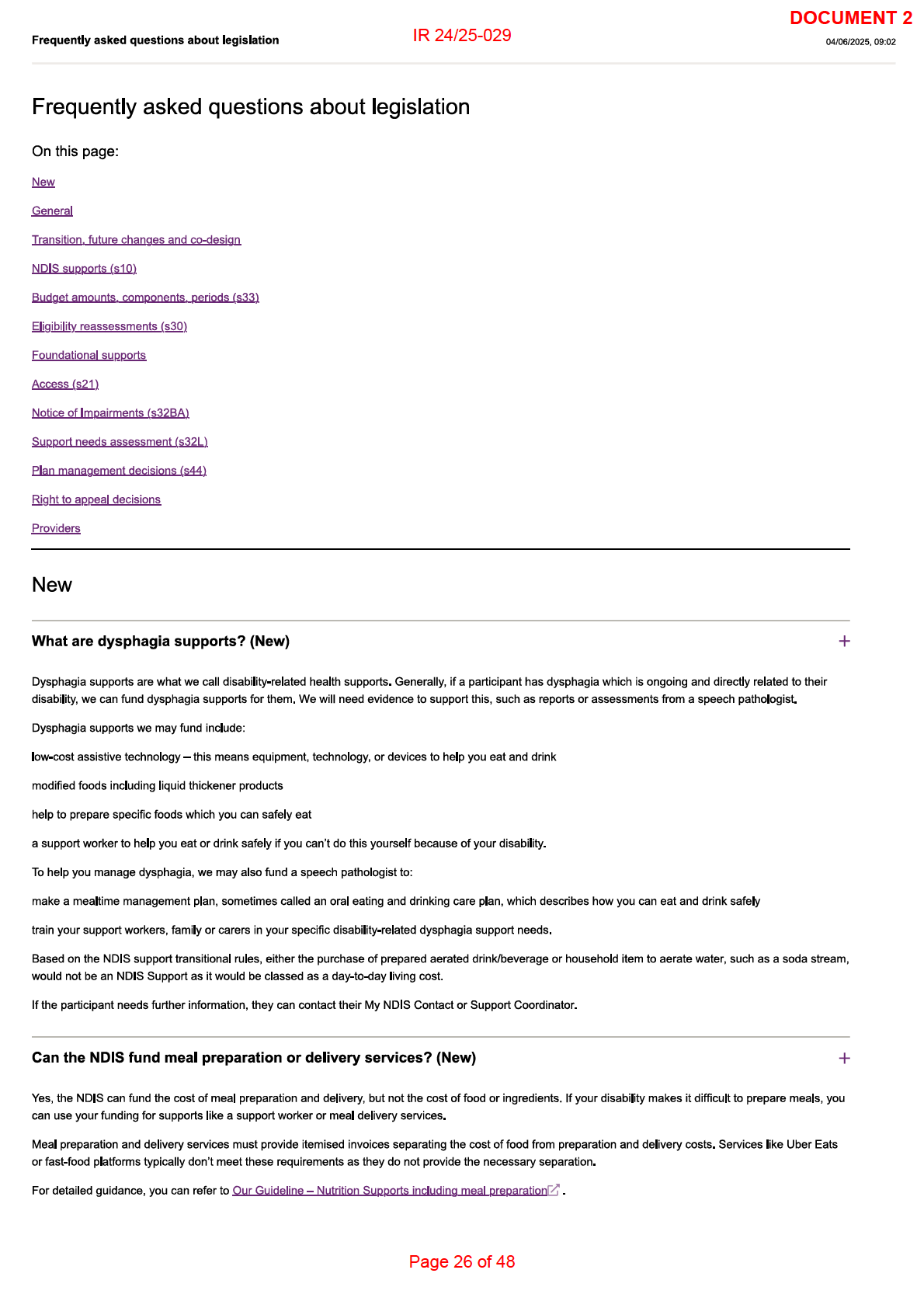
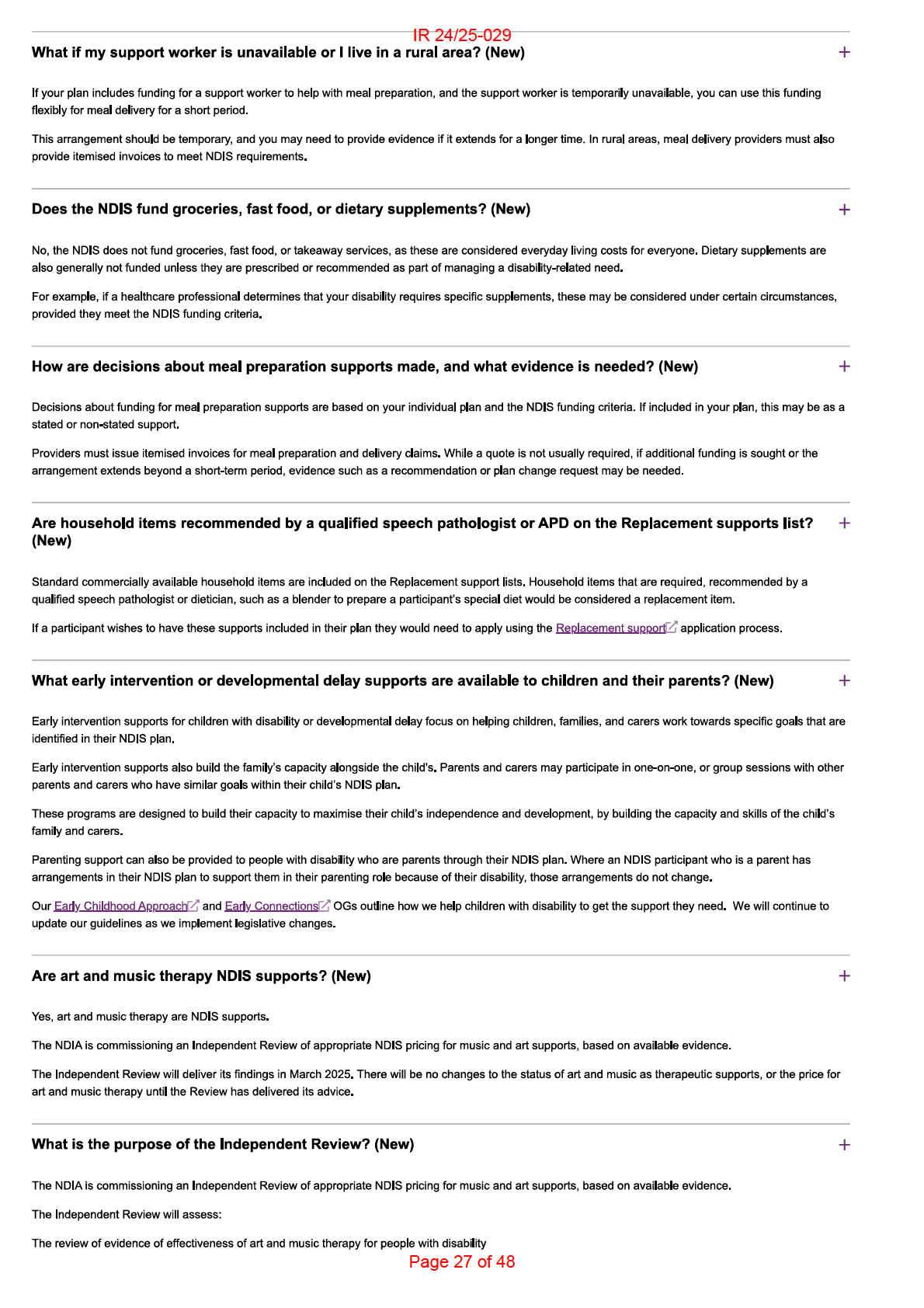
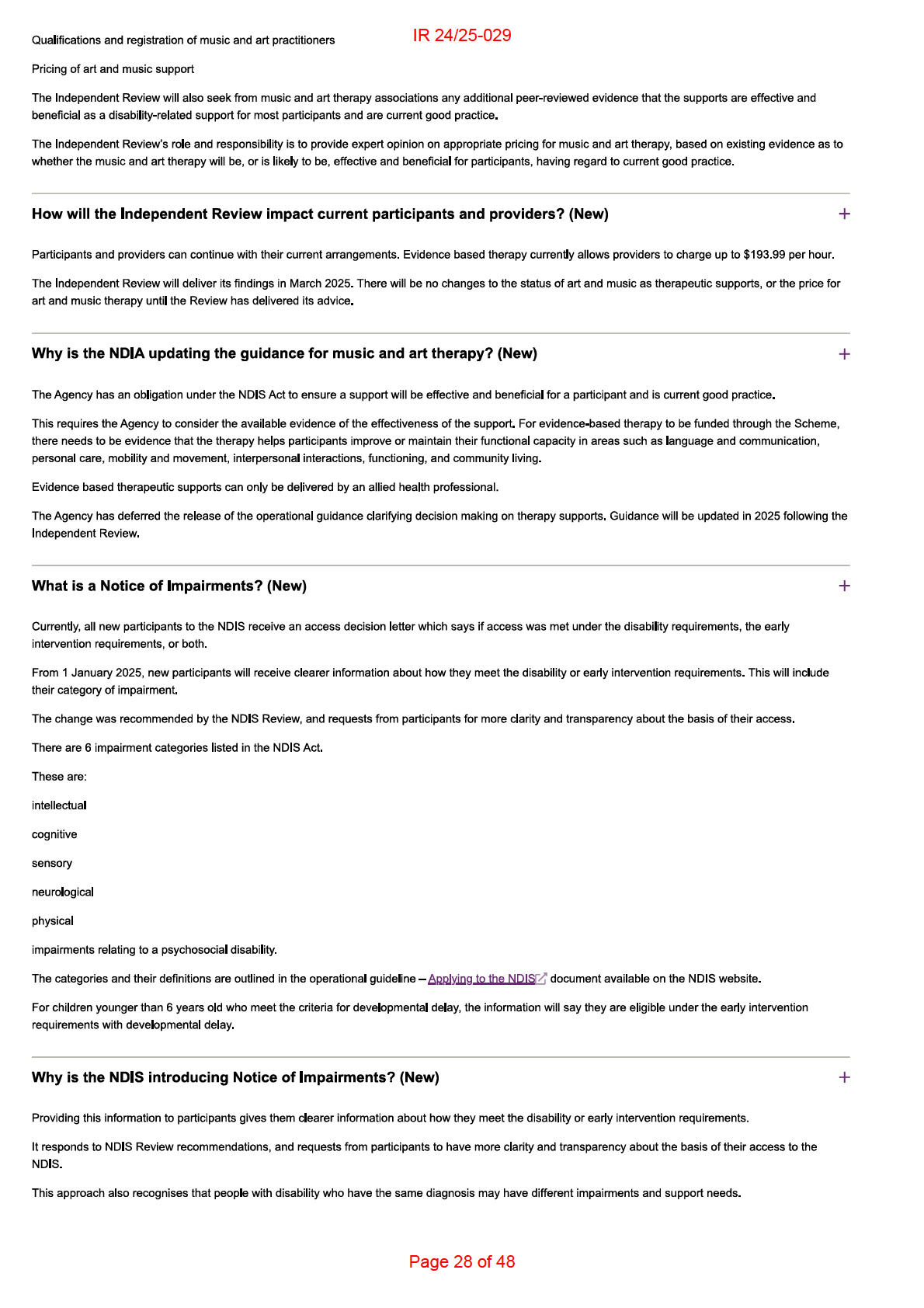
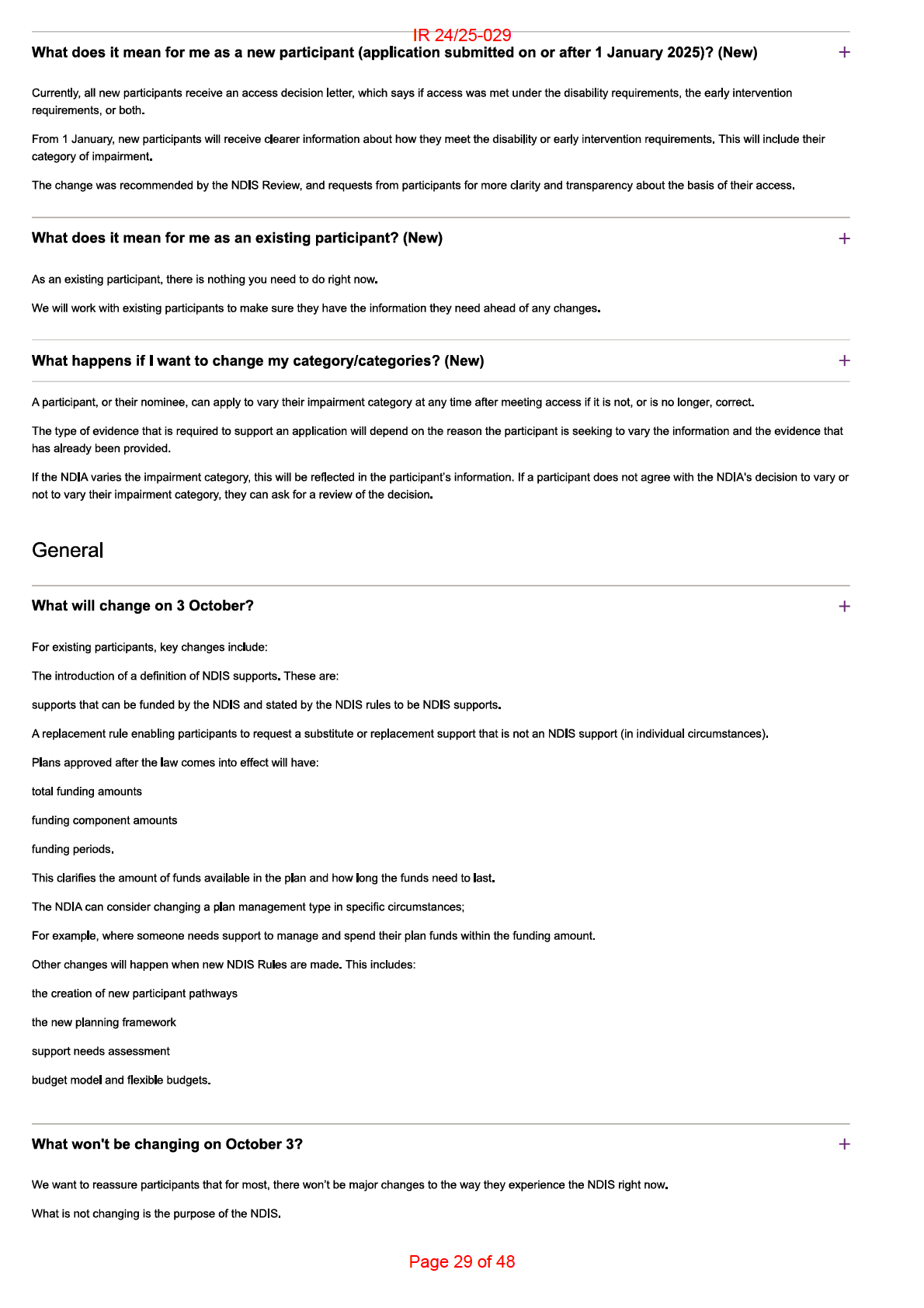






IR 24/25-029
Page 30 of 48
